
- Online Course

20 Great MBA Application Essay Samples (With Links)
Want to ace your MBA application? A stellar essay can be your golden ticket.
With elite business schools like Harvard and Stanford boasting acceptance rates as low as 10% and 6% respectively, every aspect of your application counts. While GPA and GMAT scores matter, your essay can be a game-changer. Recognizing its weight, we’ve gathered top-notch MBA essay samples, endorsed by admission committees from premier institutions. Dive in and let’s craft that standout application!
What is an MBA Application Essay?
An MBA application essay is a detailed write-up about your personal and professional goals and aspirations. It also explains how the MBA program will help you attain your objectives for the future. Your essay is your one shot to convince the admission committee to consider you for the initial interview.

What Admission Committee Look for in an MBA Essay?
- Academic ability
- Impressive work experience
- Career Course
- Authenticity of goals
- Competencies, leadership , dedication, challenges, and growth
- The right reason for pursuing an MBA
- Your compatibility with the culture in which the program is being offered
If you want to learn more, here is the complete guide on how admission committees process MBA applications.
20 Great MBA Applications Essays Samples
Now you have known that what makes a great MBA admission essay, the next step is to write one for yourself. Before writing, check out this list of expert-vetted MBA application essays that secured admissions to top-rated business schools in the world. Admission consultants have shared these samples and they can be helpful if you read and analyze them carefully. If you’re completely unsure about how to get started, there are also custom essay writing services that can help you structure your essay with the help of professional editors.
Sample 1: Leadership-focused MBA application essay
This sample is particularly focused on leadership traits. If your essay is about explaining your leadership quality experience, this sample is right up your alley. The best thing about the essay is that it is written in a simple, engaging, and humorous style. It defines a great experience in a very conversational style.

Sample 2: Self-focused MBA application essay
If you are asked to write about your strengths, weaknesses, aims, and goals in your application essay, this sample will help you. The applicant who wrote this got accepted to the INSEAD business school. It doesn’t merely describe her strengths and weaknesses, but it presents a complete picture of herself as a person. It highlighted the events and incidents that shaped her personality.
Sample 3: Life-hardships-focused MBA application essay
If you want to explain your life’s hardships and the events that turned you into an ambitious person, this sample is for you. In this application essay, the candidate has defined three phases of his life and how he survived through each adversity. He beautifully explained why the MBA program is important to his future.
Sample 4: Continuous growth and learning-focused MBA application essay
This essay was submitted to Harvard Business School. The best thing about this piece is that the writer has explained her learning and professional development journey in a very sequential and engaging manner, which is truly admirable. A useful thing to remember about the MBA essays included in this list is that you can merge them into a single printable and perfectly formatted file with Sodapdf or another PDF editor. Having all of them stored in a single PDF is going to be quite helpful when it’s time to write your piece. But guess what? There are more examples to explore below, so let’s keep going…
Sample 5: Best MBA application essay for low scorers
Have a low GPA? What would you write about academics in an MBA essay to convince the admission committee? Do not overthink! MBA essay is not all about high achievements and sterling background. It is also an opportunity to atone for your past mistakes. This MBA essay was written by a student who obtained very low academic grades, yet got admitted to her desired business school. Her turning point? A powerful application essay.

Sample 6: A guitarist’s application essay for the MBA program
Suppose you are ambitious in a skill or profession that has nothing to do with the MBA program, yet you need the degree for certain reasons. How would you showcase that irrelevant skill in your MBA application essay? This sample essay will show how you how. A guitarist who got selected for the MBA program wrote this one. The applicant has intelligently defined his passion for guitar as a way of developing discipline, determination, leadership, and success. He explained how his passion affected his academics and how the guitar helped him cope with the challenges.
Sample 7: An engineer’s essay for MBA application
If you come from a technical or engineering background and have the ambition to pursue an MBA degree to boost your engineering career, this sample essay will help pave the way for you. This essay was submitted by a mechanical engineer to Harvard Business School. The writer explained how his engineering experience motivated him to pursue an MBA and how the program is important to his long-term goals.

Sample 8: Harvard Business School MBA essay
This essay was written by a candidate who got accepted to Harvard Business School. Check it out to know what the prestigious academic institution looks for in your essay.
Sample 9: Wharton Business School MBA essay
This essay has been honored as one of the best MBA essays ever received by the Wharton Business School in Pennsylvania. Check out the structure, organization, and flow, and adapt the same to your essay.
Sample 10: Columbia Business School MBA essay
The Columbia Business School’s admission committee shared this MBA essay. They explained why the applicant who wrote this was instantly accepted to the program and why they appreciated its content.
Sample 11: Stanford Graduate School of Business MBA essay
This essay was written by a candidate who got accepted to Stanford Business School for an MBA. If you are aiming to get your MBA at Stanford, this sample will give you a deep understanding of what convinces the esteemed school’s admission committee to accept applicants into their fold.
Sample 12: University of California Business School MBA essay
This sample was taken from a pool of successful MBA application essays submitted to the University of California business school. Read it carefully and analyze its structure, words, and substance before you compose your own fantastic MBA essay.

Sample 13: University of OXFORD business school MBA essay
If Oxford Business School is your target destiny for earning your MBA, then check out this outstanding application essay. The person who wrote it managed to grab the admission committee member’s attention.
Sample 14: London Business School MBA essay
This essay was written by a candidate who got accepted to the London Business School. The school’s admission consultant shared this sample as a reference to other MBA aspirants. This piece will specifically help you understand the tone, writing style, formatting, and overall flow of the MBA application essay that meets the school’s standards.
Sample 15: A goal-oriented MBA application essay
Sometimes the MBA admission portal may demand an essay specifically focused on your future goals. In such a case, you must be very sure about yourself and must convey your goals and future directions based on your experiences and planning. Check out this sample to get an idea of how a successful candidate writes about personal goals.
Sample 16: Executive MBA essay
This successful MBA application essay was submitted to the MIT Sloan Executive MBA Program. EMBA essay requires you to show strong potential, impact, leadership, and the ultimate need for the program. Read this essay if EMBA is on your horizon.

Sample 17: MBA video essay
Many business schools are turning to video-based essays for MBA applications. A video-based essay is a better option to express yourself directly to the admission committee. A successful candidate for the Kellogg School of Management submitted this sample. Listen to the video and appreciate how beautifully the applicant has explained his journey from beginning to end. Want to learn more about video MBA essays? Here is a complete guide.
Sample 18: Short-answer-based MBA application essay
Some business schools require candidates to respond to short questions to get insights into their personalities and suitability for the MBA program. More or less, most of the questions revolve around the same theme. The key to success is to grasp the intention of the admission committee behind the questions and to stick to your identity . These successful answers submitted to the Tepper School of Business will help you in formulating your answers.
Sample 19: MIT Sloan School of Management
This essay was submitted by a successful candidate for the MIT Sloan School of Management MBA program. See how this applicant smartly answered the essay questions.
Sample 20: Michigan Ross School of Business MBA program
The Michigan Ross Business School asks a diverse range of questions from candidates to analyze their competencies from multiple perspectives. If Michigan Ross is where you intend to get your MBA, this essay submitted by a candidate who got admitted to the school’s MBA program will help keep you on track.
What Should be Included in the MBA Application Essay?
- Your background: What shaped you into what you are now? Including ethnicity, obstacles, and struggles.
- Self-reflection: Your values, characteristics, strengths, and weaknesses.
- Your goals : How do you envision your future?
- Aspirations: Why MBA is important to you and how this program will help you in shaping your future?
- Justification: If you have low academic grades, explain the reasons you did not do well and what you learned from it.
- Experience and achievements: What have you achieved so far?
These are the significant components of an MBA essay. Just adjust the sequence, play with words, and come up with a persuasive yet realistic picture of yourself.

What Makes a Great MBA Application Essay?
- Be school-specific. Explain why you are passionate about the MBA program of the school to which you’re applying.
- Avoid edition. Write simply and engagingly. Let the reader read a meaningful story about you.
- Make it 100% typo-free. Grammatical errors and typos will ruin your essay. Apply standard essay format and structure guidelines , scan your piece several times for errors, get it reviewed by an expert, and present a very professional piece to the admission committee.
- Be original. Do not copy-paste from any source. Strictly follow plagiarism guidelines.
- Write an overwhelming introduction to urge the reader to keep reading and conclude your essay with a strong declaration.
- Be authentic. Write what you are, not what the committee wants to read.
- Be concise, as many schools impose a limit on the essay word count .
Do you want more tips? Here is a complete guide to writing a compelling MBA application essay.
The application essay is a core part of the admission process in the increasingly competitive MBA program. If you do not want to miss the chance of getting selected, you need to know what will make your essay stand out . The expert-vetted list of MBA application essay samples we cited here worked for the top business schools. Learn them by heart, and who knows, it may work for you too. Put your other activities aside, read and analyze the list carefully, and start writing your MBA essay to land in your dream business school.

Digital marketing course: Join my full AI Marketing course, with over 6h and 30 minutes of video lessons and 5 bonuses and learn the skills necessary to thrive as a marketer in the digital era.

Rafal Reyzer
Hey there, welcome to my blog! I'm a full-time entrepreneur building two companies, a digital marketer, and a content creator with 10+ years of experience. I started RafalReyzer.com to provide you with great tools and strategies you can use to become a proficient digital marketer and achieve freedom through online creativity. My site is a one-stop shop for digital marketers, and content enthusiasts who want to be independent, earn more money, and create beautiful things. Explore my journey here , and don't miss out on my AI Marketing Mastery online course.

MBA Resources
Top Insightful Strategies to ace your “WHY MBA essay”: A consultant review

MBA & Beyond Team
14/11/2023 | 8:18 pm
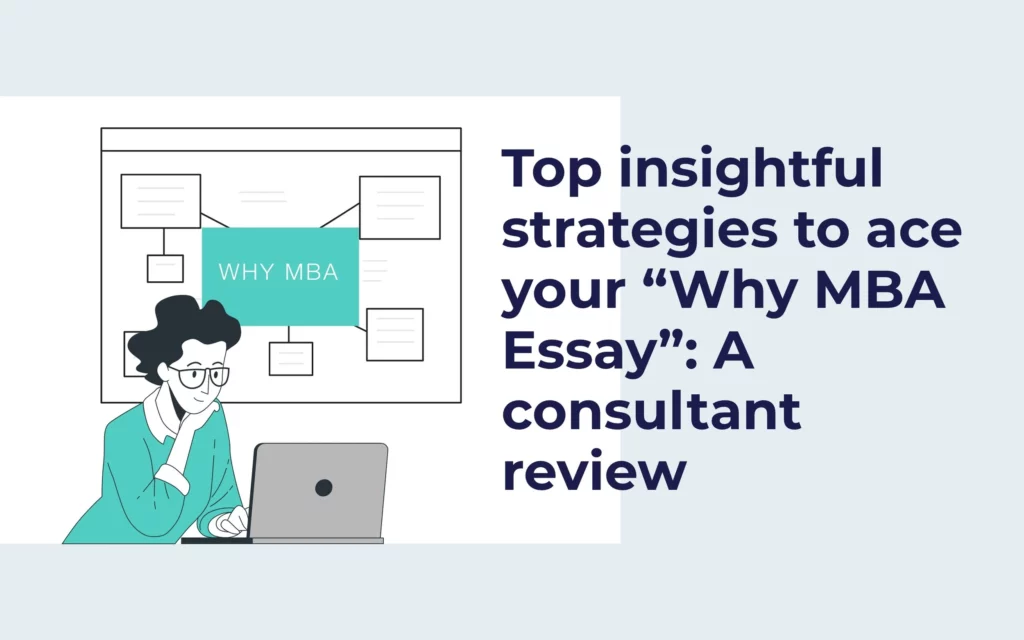
Essays are vital in your business school application, serving as a key gateway to convey your aspirations and suitability. The ‘Why MBA’ Essay Answers specifically provide the admissions committee with a detailed understanding of your reasons for pursuing an MBA, your career objectives, and how an MBA from their school aligns with your goals. This essay also signals to potential employers your readiness and fit for the business world, underscoring the importance of clarity, conviction, and alignment in your response.
An excellent ‘Why MBA’ Essay requires many strong aspects to weave your story together. That is why, together with our experts, we are here to provide some premium tips on how to develop a killer ‘Why MBA’ story.
Here is the Snapshot of the article:
WHY SHOULD YOU ACE THIS ESSAY?
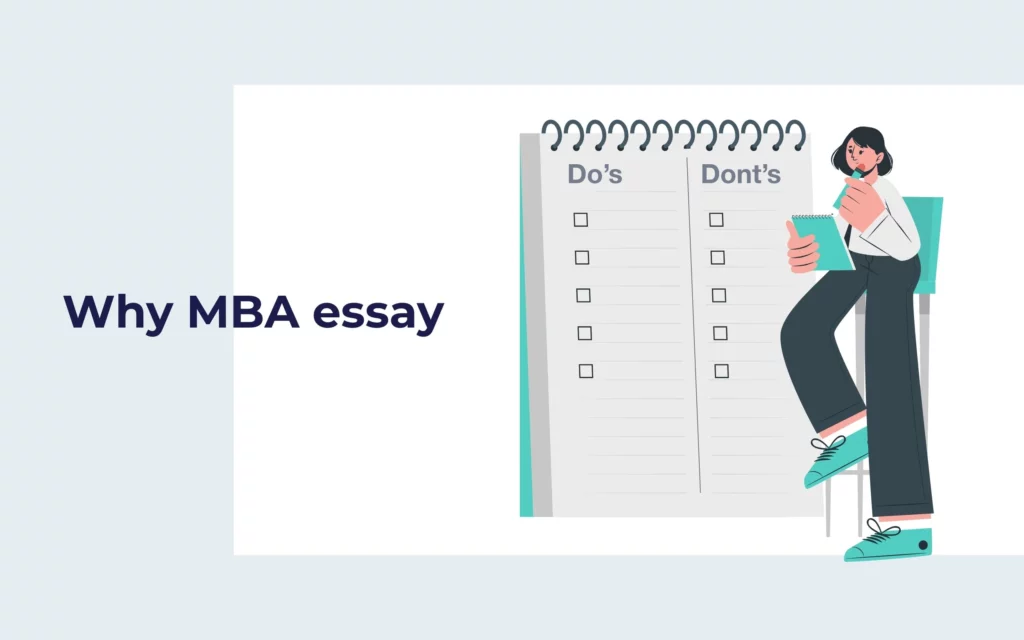
This question addresses the majority of the questions that the adcom may have about you, which is why ‘WHY MBA’ is critical to answer in order to gain the attention of the adcoms that are reading your essay.
While the question is good, the information provided by applicants is generic. The goals they mention are vague and ineffective. You want to make money, learn new things, and become a leader. So, who doesn’t like it? The question is w what motivates you to pursue an MBA?
Now, what are the reasons why you should ace the ‘WHY MBA’ essay?
Control/Responsibility
Control and responsibility come only when the firm’s top management is confident that you understand the business principles and can handle them; this comes from prior experience and knowledge obtained while pursuing the MBA; this is ” WHY MBA. “
Connections
An MBA connects you with a diverse and intellectual group beyond your everyday work environment, thereby fostering valuable networks, especially in fields you’re passionate about. Consequently, high-quality MBA programs assemble individuals from varied backgrounds, offering unmatched learning experiences.
While applicant motivations differ, the core of the “WHY MBA” question is to explain how an MBA promotes personal growth and fills educational or experiential gaps uniquely, requiring thoughtful reflection before you articulate your response.
While answering the why MBA question, it is critical to consider the post-MBA objectives and get to know them. We have a full essay on Strong Post-MBA Goals Essay Sample.
How to frame practical post MBA goals essays?
STRUCTURE OF A WINNING ESSAY FOR “WHY MBA”
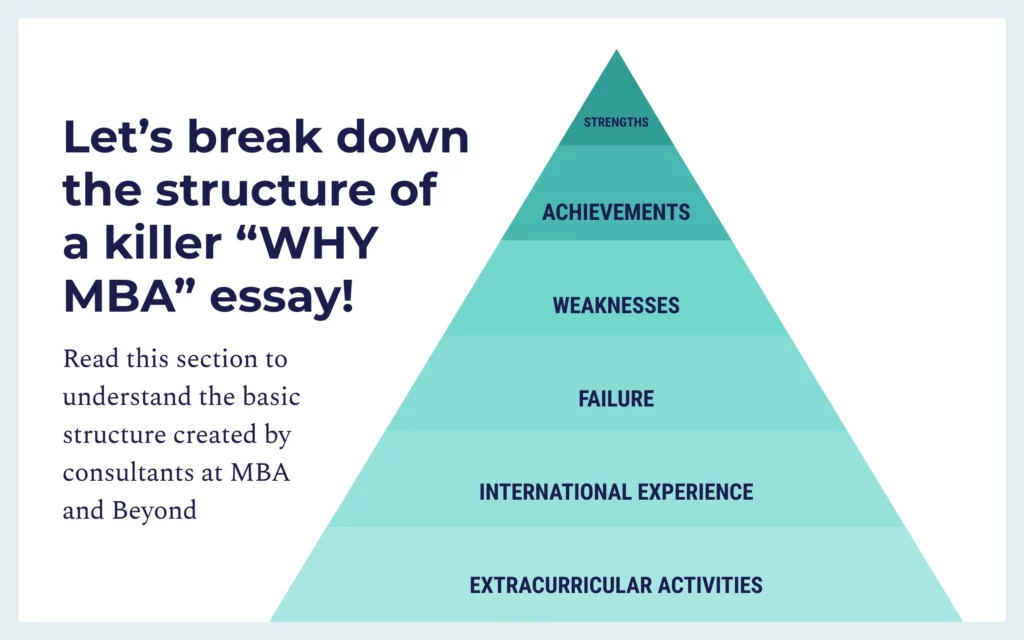
Crafting a well-defined structure proves invaluable in compiling comprehensive information about a candidate’s background, MBA and beyond designed this basic structure for individuals wishing to write a killer MBA essay
1) Strength
The admissions committee evaluates your personality, credibility, and alignment with their b-school community based on the strength of your stories. Thus, conveying your authentic self in essays is both vital and challenging. This segment aims to support you in articulating your strengths in a captivating and compelling manner, resonating with admission officers.
How to address your strengths? Click here to know more!
2) Achievements
The primary reason many strong applicants are not admitted to top business schools is their inability to effectively communicate the significance of their stories. This segment is designed to help you choose your most compelling stories and articulate them in a manner that optimizes your potential across all your applications.
3) Weakness
Addressing your weaknesses proves to be the most challenging aspect of your application. Many candidates falter in this area because they often misunderstand what admissions authorities seek to learn about their weaknesses. Weakness stories should focus on how you navigated a situation rather than dwelling solely on the context or the events that transpired.
How to address your weaknesses? Click here to know more!
Incorporate no more than one or two weaknesses, ensuring you go beyond mere acknowledgment. It’s crucial to offer a reasoned justification rooted in your future aspirations. Ask yourself why you seek to change a particular aspect and consider how this transformation aligns with your goal of personal growth.
Do you realize there’s a fine line between weakness and failure? What is that fine line, and how can you explain your shortcomings so that you project a good and influential personality in your essays? Weaknesses are dynamic and evolve over time, while failure tends to be more fixed. It showcases the challenges you’ve overcome and highlights your distinctive qualities.
5) International experience
In a business school, the learning extends beyond professors to encompass valuable insights gained from classmates. Hailing from diverse backgrounds, these peers play a crucial role in shaping your educational experience. Admission authorities are keen to understand your ability to showcase your value in such a varied and dynamic setting.
Suggested Reading: What do Business schools mean by International Experience?
6) Extracurricular activities
The extracurricular area provides a chance to demonstrate the colorful, dynamic personality that b-schools want. However, what should you highlight in this section if you’re not engaged in organizational activities? Even if you have, which ones should you choose to make the greatest influence on the admissions committee?
Extracurricular activities should have two characteristics: For starters, it personally enriches you. Second, your ECs should have some communal effect.
What is the role of Extracurriculars activities in your MBA applications? Click here to learn more
Your post-MBA short-term and long-term ambitions are critical in creating a cohesive picture for the admissions committee.
If you are unable to establish clear connections between your job experience, short-term goals, and long-term ambitions, there’s a potential risk of compromising your admission prospects to a top MBA program, even with an otherwise stellar profile.
Suggested reading: How to frame practical post MBA goals essays? Strong Post MBA goals essays Sample
Every business school asks “Why MBA?”—a question many candidates struggle with. We’ve broken it down: Checklist 1.0 focuses on your current skills and role, while Checklist 2.0 envisions your future post-MBA. The MBA serves as the bridge from 1.0 to 2.0, shaping your answer to “Why MBA?” and outlining the skills you’ll gain to evolve into your future self.
Suggested Reading: How to build your MBA application ?
Let’s look at an example with a table
Our product assists applicants in writing a powerful essay with impactful “Why MBA” Essay answers by filling in the holes that applicants overlook. Additionally, our product is free to use and provides a framework that anybody can use.
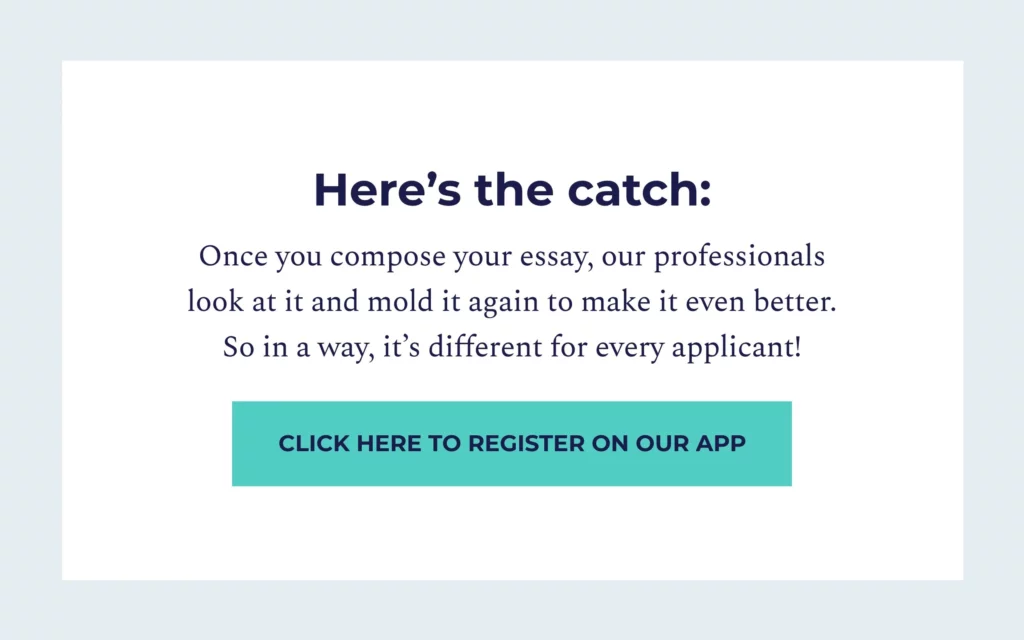
DO’S AND DON’T WHILE WRITING THIS ESSAY
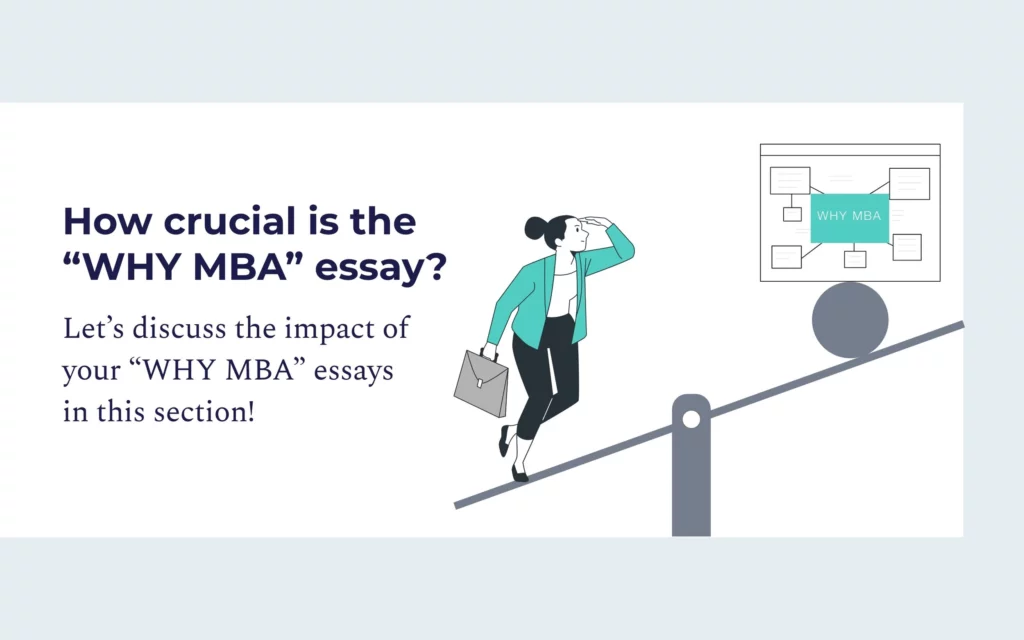
Crafting essays, particularly “Why MBA” Essay answers, is vital for articulating your thoughts and shaping the admissions committee’s perception of you. Moreover, these essays go beyond academic achievements, authentically reflecting your response to the ‘Why MBA’ question, helping to paint a comprehensive picture of your motivations and aspirations for pursuing an MBA before your interview.
1) Tell your own story – Everyone aims to stand out and make a memorable impact, particularly through “Why MBA” Essay answers. Remember, this essay should reflect your unique voice, a trait only you can genuinely convey.
2) Be truthful- Admissions officials, like it or not, are like lie detectors. They have a keen ability to discern the distinction between an authentic candidate and one attempting to deceive.
3) Tell them about the Goals – Share your objectives and elucidate how an MBA can contribute to realizing those goals as your “Why MBA” essay answers.
4) Why you are the best fit for the school – Admissions officers will want to know why after you’ve selected to attend a specific business school.
5) Research – Research provides a distinct advantage, and numerous expert guidance websites (such as MBA and Beyond) offer essential information and recommendations for crafting a ‘WHY MBA’ essay.
6) Practice your essay- Don’t be concerned about the word limit while composing your essay. Initially, put down all your thoughts on paper without worrying about refinement.
DONT’S
1) CV is not your essay. – Transforming your CV into an essay is not advisable. The admissions committee is already aware of your academic and professional achievements through your resume. Now, they seek to gain deeper insights into your personality and understand your motivations for pursuing an MBA.
2) A sob story is not always an option – Using a sob story to elicit sympathy is not an effective strategy for gaining attention unless it directly addresses the question. Otherwise, it may create a negative impression of you in the eyes of the admission committee.
ESSAY EXAMPLES
Despite highlighting the do’s and don’ts, applicants often make errors in their essays. To assist, we provide examples of successful candidates admitted to top B-schools. These examples can guide you in assessing your standing and applying the mentioned principles systematically.
INSEAD Success story essays
This is an example in which we requested candidates to compose the essay without any aid and then assisted them in identifying gaps and filling those gaps with appropriate remarks. Click here to access
Different colleges pose distinct essay questions, and responding uniquely to each is key to navigating the process successfully. For instance, Kellogg, INSEAD, and Darden each emphasize different aspects in their requirements.
EXAMPLES OF GOOD “WHY MBA” ANSWERS
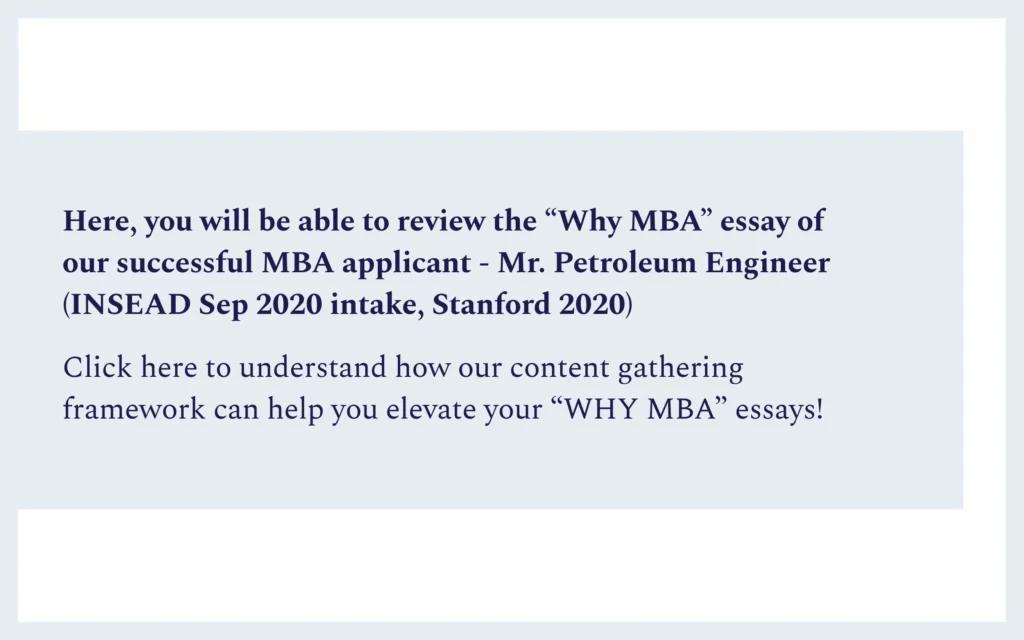
*An MBA will help me grasp how firms operate and are controlled. My long-term objective is to become a company’s CFO with a whole perspective of the entire firm. My Undergraduate degree has given me a solid foundation in accounting and finance. An MBA will teach me strategy, marketing, international business, law, and the necessary soft skills to be a successful corporate leader.*
Though grades, courses, and test scores are crucial, essays, particularly “Why MBA” Essay answers, can distinguish you in your application. They offer a direct connection with admissions officers, addressing critical questions like “Why MBA?” and why you choose a specific school. Consequently, these essays significantly impact Adcoms, showcasing your commitment and aligning your aspirations with the MBA program’s offerings, thereby illustrating your dedication to the school once admitted.
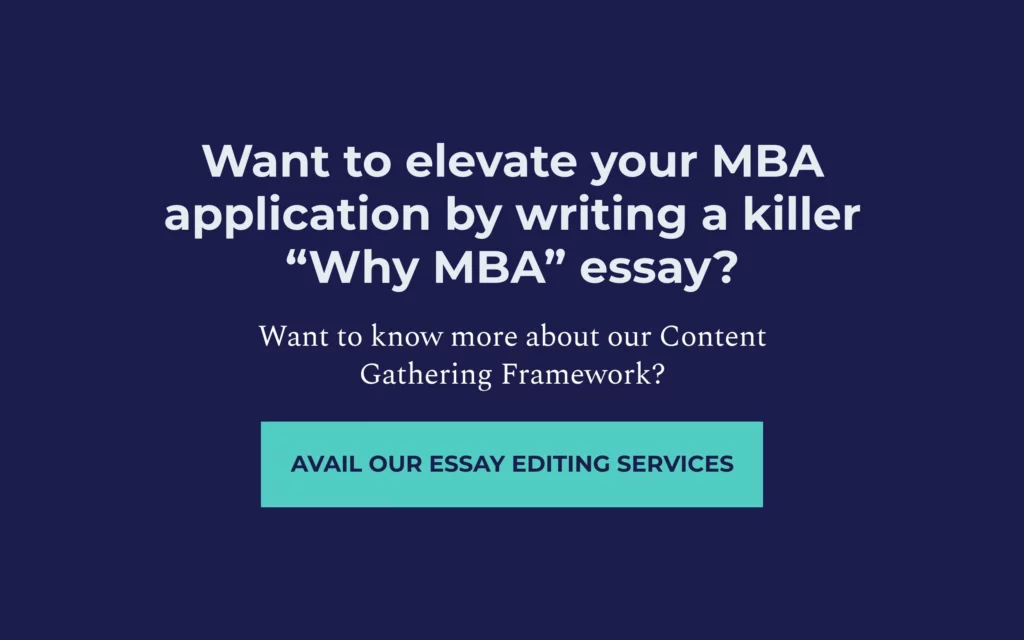
We believe in every applicant’s ability to complete the application process, which is why we developed a product designed to aid applicants in essay writing. Our experts help identify gaps and guide them in crafting a compelling essay that stands out.
So, schedule a call with us today and have our experts point out your gaps so you can fill them with something concrete. Book a free evaluation call with our experts now.
Frequently Asked Questions
Why are you doing an MBA answer?
This is a question that every business school asks, and only a few MBA applicants can answer it. This has been broken into two sections: checklist 1.0 and checklist 2.0. MBA is necessary to bridge the version 1.0-to-version 2.0 gap. This gap serves as your answer to the question, “Why MBA?” This response will help you realize the necessity for an MBA and acquire the skills needed to become version 2.0.
How do you conclude an MBA essay?
– Link your conclusion and your introduction.
– Include a surprising twist.
– Be unique to stand out.
Leave a Reply
Your email address will not be published. Required fields are marked *
Articles You Might Like

Should an International Candidate go for an INSEAD R3 MBA?

Top MBA programs starting in January 2024
Upcoming Events

Unlock Your MBA Future: Expert Guidance for the Round 1 September 25 Intake MBA Programs
April 4, 2024 | 9:00 pm – 10:00 pm
UPCOMING EVENT: Unlock Your MBA Future: Expert Guidance for the Round 1 September 25 Intake MBA Programs. Register now
FR Hauts-de-France
Recently viewed courses
Recently viewed.
Find Your Dream School
This site uses various technologies, as described in our Privacy Policy, for personalization, measuring website use/performance, and targeted advertising, which may include storing and sharing information about your site visit with third parties. By continuing to use this website you consent to our Privacy Policy and Terms of Use .
COVID-19 Update: To help students through this crisis, The Princeton Review will continue our "Enroll with Confidence" refund policies. For full details, please click here.
20 Must-Read MBA Essay Tips

Business school admissions committees care about more than (just) your GMAT scores and GPA —they want to know who you are and why you belong in their program . Your MBA essays are your best chance to sell the person behind the résumé. They should tie all the pieces of your business school application together and create a comprehensive picture of who you are, what you've done, and what you bring to the table. Here's a roundup of our best MBA essay tips to keep in mind as you begin to write.
How to Write an Unforgettable B-School Essay
1. communicate that you are a proactive, can-do sort of person..
Business schools want leaders, not applicants content with following the herd.
2. Put yourself on ego-alert.
Stress what makes you unique, not what makes you number one.
3. Communicate specific reasons why you're great fit for each school.
Simply stating "I am the ideal candidate for your program" won't convince the admission committee to push you into the admit pile.
Read More: Find Your Business School
4. Bring passion to your writing.
Admissions officers want to know what excites you. And if you'll bring a similar enthusiasm to the classroom.
5. Break the mold.
Challenge perceptions with unexpected essays that say, "There's more to me than you think."
6. If you've taken an unorthodox path to business school, play it up.
Admissions officers appreciate risk-takers.
7. Talk about your gender, ethnicity, minority status or foreign background....
But only if it has affected your outlook or experiences.
8. Fill your essays with plenty of real-life examples.
Specific anecdotes and vivid details make a much greater impact than general claims and broad summaries.
9. Demonstrate a sense of humor or vulnerability.
You're a real person, and it's okay to show it!
BONUS: Don't Make These MBA Essay Mistakes
1. write about your high school glory days. .
Admissions committees don't care if you were editor of the yearbook or captain of the varsity team. They expect their candidates to have moved onto more current, professional achievements.
2. Submit essays that don't answer the questions.
An off-topic essay, or one that merely restates your résumé, will frustrate and bore the admissions committee. More importantly, it won't lead to any new insight about you.
Attend UNC's top-ranked online MBA program without putting your career on hold. See how.
3. Fill essays with industry jargon.
Construct your essays with only enough detail about your job to frame your story and make your point.
4. Reveal half-baked reasons for wanting the MBA.
Admissions officers favor applicants who have well-defined goals. However unsure you are about your future, it's critical that you demonstrate that you have a plan.
5. Exceed the recommended word limits.
This suggests you don't know how to follow directions, operate within constraints or organize your thoughts.
6. Submit an application full of typos and grammatical errors.
A sloppy application suggests a sloppy attitude.
7. Send one school an essay intended for another—or forget to change the school name when using the same essay for several applications.
Admissions committees are (understandably) insulted when they see another school's name or forms.
8. Make excuses.
If your undergraduate experience was one long party, be honest. Discuss how you've matured, both personally and professionally.
9. Be impersonal in the personal statement.
Many applicants avoid the personal like the plague. Instead of talking about how putting themselves through school lowered their GPA, they talk about the rising cost of tuition in America. Admissions officers want to know about YOU.
Read More: How to Ace Your MBA Interview
10. Make too many generalizations.
An essay full of generalizations is a giveaway that you don't have anything to say.
11. Write in a vacuum.
Make sure that each of your essays reinforce and build on the others to present a consistent and compelling representation of who you are, what you've done, and what you bring to the table.
Practice for the GMAT
Take a GMAT practice test with us under the same conditions as the real thing. You'll get a personalized score report highlighting your strengths and areas of improvement.
START A FREE PRACTICE TEST
- Business School

Find MBA Programs Matched to Your Interests
Explore our featured business schools to find those that are looking for students like you.

Top Online MBA Programs
On a mission to increase your salary? Our Top 50 Online MBA ranking is based on academics, career outcomes, tech platforms, and more.

Best Career Prospects
Find out which schools have the best track records for getting students jobs—and the highest starting salaries.

Top Schools for Entrepreneurship
Ready to build your own business from the ground up? Check out these 50 graduate programs.
What would you score on the MCAT today?
Thank you! Look for the MCAT Review Guide in your inbox.
I already know my score.
Enrollment Advisor
1-800-2REVIEW (800-273-8439) ext. 1
1-877-LEARN-30
Mon-Fri 9AM-10PM ET
Sat-Sun 9AM-8PM ET
Student Support
1-800-2REVIEW (800-273-8439) ext. 2
Mon-Fri 9AM-9PM ET
Sat-Sun 8:30AM-5PM ET
Partnerships
- Teach or Tutor for Us
College Readiness
International
Advertising
Affiliate/Other
- Enrollment Terms & Conditions
- Accessibility
- Cigna Medical Transparency in Coverage
Register Book
Local Offices: Mon-Fri 9AM-6PM
- SAT Subject Tests
Academic Subjects
- Social Studies
Find the Right College
- College Rankings
- College Advice
- Applying to College
- Financial Aid
School & District Partnerships
- Professional Development
- Advice Articles
- Private Tutoring
- Mobile Apps
- Local Offices
- International Offices
- Work for Us
- Affiliate Program
- Partner with Us
- Advertise with Us
- International Partnerships
- Our Guarantees
- Accessibility – Canada
Privacy Policy | CA Privacy Notice | Do Not Sell or Share My Personal Information | Your Opt-Out Rights | Terms of Use | Site Map
©2024 TPR Education IP Holdings, LLC. All Rights Reserved. The Princeton Review is not affiliated with Princeton University
TPR Education, LLC (doing business as “The Princeton Review”) is controlled by Primavera Holdings Limited, a firm owned by Chinese nationals with a principal place of business in Hong Kong, China.
2 MBA Admissions Essays That Worked
These outstanding MBA personal statements resulted in admissions offers.
2 MBA Essays That Worked

Getty Images
MBA admissions officials say they prefer personal statements that convey personality and demonstrate grit.
There is no secret formula to writing a compelling personal statement for an MBA application, university admissions officials say.
The key, they say, is to write a statement that feels authentic and makes your case.
Bruce DelMonico, assistant dean for admissions at the Yale University School of Management , is wary of personal statements that tell dramatic stories and stretch the truth. He says he is not looking for students to have exotic experiences, but for evidence of resilience, introspection and initiative.
Yale's business school recruits students identified as unselfish leaders – those who strive to improve the circumstances of others and help themselves rather than those who exploit others for personal gain, DelMonico says.
"We are looking to bring in students who will be inclusive leaders and who will bring people together," DelMonico says.
William Rieth, former senior director with the Fox School of Business at Temple University , says applicants sometimes struggle to write a memorable personal statement, but being memorable is vital.
"Students need to remember their audience," he says. "Schools are reading thousands of essays."
He says a solid personal statement requires a "compelling story" and an honest writing voice. "It should reflect your personality and sound like you."
How to Write an MBA Application Essay: A Few Tips
MBA admissions experts say a business school application essay should offer a convincing argument about why a candidate belongs in an MBA program at that particular school.
Wayne Hutchison, managing director for the MBA program at Michigan State University’s Eli Broad College of Business , urges prospective MBA students to explain their reasons for applying to B-school and to describe whatever incidents spurred their interest in graduate business education.
"In addition, applicants should discuss the skills and abilities they have that will translate to academic and professional success," Hutchison wrote in an email, noting that failing to include this information can lead admissions officers to question an MBA hopeful's competitiveness.
Aaron Burch, who earned his MBA degree from the University of Texas—Austin's McCombs School of Business , says MBA essays should address the following questions:
- "What do you want to accomplish career-wise that either requires an MBA or will be accelerated by an MBA?"
- "Why is this the exact point in your career where an MBA would be most impactful?"
- "What about this particular school is especially important for your career plans?"
- "How will you contribute?"
Burch, owner of DiscoverContainers.com – a website that provides information about shipping container houses – suggests that MBA students convey that they are at a point in their careers where they can "pivot without being pigeonholed" while having meaningful accomplishments, including "real responsibility."
It's also essential for MBA candidates to showcase what they have to offer a B-school, Burch wrote in an email. "You want to demonstrate that you're not just a taker and you want to add to the prestige and reputation of the school, add to the experience your future classmates will have, etc."
MBA alumni say it's crucial for prospective MBA students to describe how they intend to use an MBA .
"Admissions officers will want to understand your vision behind why an MBA might help you, so it's incumbent upon you to articulate the plan you have for yourself, and how their institution is going to help your journey," MBA degree recipient Taylor Constantine – the partner channel lead with Rain, a financial services company – wrote in an email.
Margo Bell, senior assistant director of admissions with Pepperdine University's Graziadio Business School in California, notes that MBA essays are influential factors in the MBA admissions process. Application essays help B-school admissions committees gauge the compatibility of a prospective student with the culture and values of the institution.
"As applicants begin to write their MBA applicant essays, it’s important for prospective students to share who they are as an individual," Bell wrote in an email. "The essay allows MBA admission officers to get a better understanding of who you are, what you wish to accomplish and why you deserve to be accepted."
Michal Strahilevitz, associate professor of marketing with St. Mary's College of California , advises MBA applicants to view the application essay as an opportunity to provide context for deficits in their admissions profile. "For example, if your undergraduate grades were not great because you worked full time to pay for school, write about it," Strahilevitz explained in an email.
What to Keep in Mind About MBA Essay Prompts
MBA admissions consultants note that business schools often have distinctive essay prompts, so it's important for applicants to tailor their essay to every school where they apply.
"Each school asks a specific question in the essay, and one of the most important things you can do as an applicant is to answer that question – not the question you wished we asked or the one you want to answer," DelMonico wrote in an email. "The various elements of the application fit together, and we’re looking to get very specific pieces of information from the essay. So please follow the essay instructions you’re given and don’t feel as though you need to or should make the essay broader in scope."
Barbara Coward, founder of the MBA 360° Admissions Consulting firm based in the Baltimore-Washington metropolitan area, notes that the first step in the essay writing process should be meticulously reading the question prompt. Think about the question for a few days while going about routine tasks so that ideas can "marinate."
Coward says that once prospective students have decided what they'd like to write about, they should let the words flow without filtering them because too much self-editing at the beginning of the creative process can interfere with productivity. Revisions and tweaks can come after an applicant has fully expressed his or her ideas.
Admissions experts note that MBA hopefuls who are struggling to figure out how to describe themselves may want to ask friends and family for advice. Prospective MBA students can also gain self-awareness by keeping a diary or creating a storyboard of their life.
Mistakes to Avoid in MBA Admission Essays
Taking too long to express the main idea or central thesis of an essay is a no-no, Coward says. Applicants should directly respond to a question and ensure that their essay is easily understood by an admissions officer. "Keep in mind that somebody is not reading a novel," she says. "They're going to be glancing through."
Excessively verbose essays don't make a good impression, Coward adds. Applicants should respect word limits and be concise, because doing otherwise creates extra work for admissions officers under time pressure, she explains.
Two other errors to avoid in MBA essays, Coward says, are being monotonous or melodramatic . It's important to have an introductory sentence that strikes the right tone, she adds. "You're not trying to create drama, but you don't want to put the person to sleep either," Coward says.
Examples of Outstanding MBA Essays
Here are two MBA essays that made the cut. The first is from the Fox School of Business and the second is from Yale. These essays are annotated with comments that explain why the essays charmed admissions committees.
Searching for a business school? Get our complete rankings of Best Business Schools .
Tags: graduate schools , business school , MBAs , students
You May Also Like
Should you get an mba degree.
Ilana Kowarski and Cole Claybourn May 16, 2023

MBA Programs With the Highest ROI
Ilana Kowarski and Cole Claybourn June 16, 2023

Ilana Kowarski May 1, 2020

How to Decide if an MBA Is Worth it
Sarah Wood March 27, 2024

4 Surprising MBA Application Mistakes
Andrew Warner March 18, 2024

How to Find Money to Pay for an MBA
Ilana Kowarski and Cole Claybourn Jan. 16, 2024

20 Business Schools for a Global MBA
Ilana Kowarski and Cole Claybourn Nov. 28, 2023

Ask About MBA Career Services
Cole Claybourn Nov. 7, 2023

Evaluate an MBA Specialization
Cole Claybourn July 31, 2023

7 Surprising Jobs for MBA Graduates
Ilana Kowarski and Cole Claybourn June 12, 2023

About Stanford GSB
- The Leadership
- Dean’s Updates
- School News & History
- Commencement
- Business, Government & Society
- Centers & Institutes
- Center for Entrepreneurial Studies
- Center for Social Innovation
- Stanford Seed
About the Experience
- Learning at Stanford GSB
- Experiential Learning
- Guest Speakers
- Entrepreneurship
- Social Innovation
- Communication
- Life at Stanford GSB
- Collaborative Environment
- Activities & Organizations
- Student Services
- Housing Options
- International Students
Full-Time Degree Programs
- Why Stanford MBA
- Academic Experience
- Financial Aid
- Why Stanford MSx
- Research Fellows Program
- See All Programs
Non-Degree & Certificate Programs
- Executive Education
- Stanford Executive Program
- Programs for Organizations
- The Difference
- Online Programs
- Stanford LEAD
- Stanford Innovation and Entrepreneurship Certificate
- Seed Transformation Program
- Aspire Program
- Seed Spark Program
- Faculty Profiles
- Academic Areas
- Awards & Honors
- Conferences
Faculty Research
- Publications
- Working Papers
- Case Studies
Research Hub
- Research Labs & Initiatives
- Business Library
- Data, Analytics & Research Computing
- Behavioral Lab
Research Labs
- Cities, Housing & Society Lab
- Golub Capital Social Impact Lab
Research Initiatives
- Corporate Governance Research Initiative
- Corporations and Society Initiative
- Policy and Innovation Initiative
- Rapid Decarbonization Initiative
- Stanford Latino Entrepreneurship Initiative
- Value Chain Innovation Initiative
- Venture Capital Initiative
- Career & Success
- Climate & Sustainability
- Corporate Governance
- Culture & Society
- Finance & Investing
- Government & Politics
- Leadership & Management
- Markets & Trade
- Operations & Logistics
- Opportunity & Access
- Organizational Behavior
- Political Economy
- Social Impact
- Technology & AI
- Opinion & Analysis
- Email Newsletter
Welcome, Alumni
- Communities
- Digital Communities & Tools
- Regional Chapters
- Women’s Programs
- Identity Chapters
- Find Your Reunion
- Career Resources
- Job Search Resources
- Career & Life Transitions
- Programs & Services
- Career Video Library
- Alumni Education
- Research Resources
- Volunteering
- Alumni News
- Class Notes
- Alumni Voices
- Contact Alumni Relations
- Upcoming Events

Admission Events & Information Sessions
- MBA Program
- MSx Program
- PhD Program
- Alumni Events
- All Other Events
- Second Year
- Global Experiences
- JD/MBA Joint Degree
- MA Education/MBA Joint Degree
- MD/MBA Dual Degree
- MPP/MBA Joint Degree
- MS Computer Science/MBA Joint Degree
- MS Electrical Engineering/MBA Joint Degree
- MS Environment and Resources (E-IPER)/MBA Joint Degree
- Academic Calendar
- Clubs & Activities
- LGBTQ+ Students
- Military Veterans
- Minorities & People of Color
- Partners & Families
- Students with Disabilities
- Student Support
- Residential Life
- Student Voices
- MBA Alumni Voices
- A Week in the Life
- Career Support
- Employment Outcomes
- Cost of Attendance
- Knight-Hennessy Scholars Program
- Yellow Ribbon Program
- BOLD Fellows Fund
- Application Process
- Loan Forgiveness
- Contact the Financial Aid Office
- Evaluation Criteria
- GMAT & GRE
- English Language Proficiency
- Personal Information, Activities & Awards
- Professional Experience
- Letters of Recommendation
- Optional Short Answer Questions
- Application Fee
- Reapplication
- Deferred Enrollment
- Entering Class Profile
- Event Schedule
- Ambassadors
- New & Noteworthy
- Ask a Question
- Student Life & Community
- Career Impact
- Tuition & Aid
Essays help us learn about who you are rather than solely what you have done.
Other parts of the application give insight into your academic and professional accomplishments; the essays reveal the person behind those achievements.
Essay Questions
We request that you write two personal essays.
In each essay, we want to hear your genuine voice. Think carefully about your values, passions, aims, and dreams. There is no “right answer” to these questions - the best answer is the one that is truest for you.
Essay A: What matters most to you, and why?
For this essay, we would like you to reflect deeply and write from the heart. Once you’ve identified what matters most to you, help us understand why. You might consider, for example, what makes this so important to you? What people, insights, or experiences have shaped your perspectives?
Essay B: Why Stanford?
Describe your aspirations and how your Stanford GSB experience will help you realize them. If you are applying to both the MBA and MSx programs, use Essay B to address your interest in both programs.
Both essays combined may not exceed 1,050 words. We recommend up to 650 words for Essay A and up to 400 words for Essay B. We often read effective essays that are written in fewer words.
Editing Your Essays
Begin work on the essays early to give yourself time to reflect, write, and edit.
Feel free to ask friends or family members for feedback, especially about whether the tone and voice sound like you. Your family and friends know you better than anyone. If they think the essays do not capture who you are, what you believe, and what you aspire to do, then surely we will be unable to recognize what is distinctive about you.
Feedback vs. Coaching
There is a big difference between “feedback” and “coaching.” You cross that line when any part of the application (excluding the letters of recommendation ) ceases to be exclusively yours in either thought or word.
Appropriate feedback occurs when others review your completed application - perhaps once or twice - and apprise you of omissions, errors, or inaccuracies that you later correct or address. After editing is complete, your thoughts, voice, and style remain intact. Inappropriate coaching occurs when you allow others to craft any part of your application for you and, as a result, your application or self-presentation is not authentic.
It is improper and a violation of the terms of this application process to have someone else write your essays. Such behavior will result in denial of your application or revocation of your admission.
Additional Information
If there is any information that is critical for us to know and is not captured elsewhere, include it in the “Additional Information” section of the application. Pertinent examples include:
- Extenuating circumstances affecting your candidacy, including academic, work, or test-taking experiences
- Academic experience (e.g., independent research) not noted elsewhere
This section should not be used as an additional essay.
- See the Current DEI Report
- Supporting Data
- Research & Insights
- Share Your Thoughts
- Search Fund Primer
- Teaching & Curriculum
- Affiliated Faculty
- Faculty Advisors
- Louis W. Foster Resource Center
- Defining Social Innovation
- Impact Compass
- Global Health Innovation Insights
- Faculty Affiliates
- Student Awards & Certificates
- Changemakers
- Dean Jonathan Levin
- Dean Garth Saloner
- Dean Robert Joss
- Dean Michael Spence
- Dean Robert Jaedicke
- Dean Rene McPherson
- Dean Arjay Miller
- Dean Ernest Arbuckle
- Dean Jacob Hugh Jackson
- Dean Willard Hotchkiss
- Faculty in Memoriam
- Stanford GSB Firsts
- Certificate & Award Recipients
- Dean’s Remarks
- Keynote Address
- Teaching Approach
- Analysis and Measurement of Impact
- The Corporate Entrepreneur: Startup in a Grown-Up Enterprise
- Data-Driven Impact
- Designing Experiments for Impact
- Digital Business Transformation
- The Founder’s Right Hand
- Marketing for Measurable Change
- Product Management
- Public Policy Lab: Financial Challenges Facing US Cities
- Public Policy Lab: Homelessness in California
- Lab Features
- Curricular Integration
- View From The Top
- Formation of New Ventures
- Managing Growing Enterprises
- Startup Garage
- Explore Beyond the Classroom
- Stanford Venture Studio
- Summer Program
- Workshops & Events
- The Five Lenses of Entrepreneurship
- Leadership Labs
- Executive Challenge
- Arbuckle Leadership Fellows Program
- Selection Process
- Training Schedule
- Time Commitment
- Learning Expectations
- Post-Training Opportunities
- Who Should Apply
- Introductory T-Groups
- Leadership for Society Program
- Certificate
- 2023 Awardees
- 2022 Awardees
- 2021 Awardees
- 2020 Awardees
- 2019 Awardees
- 2018 Awardees
- Social Management Immersion Fund
- Stanford Impact Founder Fellowships and Prizes
- Stanford Impact Leader Prizes
- Social Entrepreneurship
- Stanford GSB Impact Fund
- Economic Development
- Energy & Environment
- Stanford GSB Residences
- Environmental Leadership
- Stanford GSB Artwork
- A Closer Look
- California & the Bay Area
- Voices of Stanford GSB
- Business & Beneficial Technology
- Business & Sustainability
- Business & Free Markets
- Business, Government, and Society Forum
- Get Involved
- Joint & Dual Degrees
- See Why Stanford MSx
- Is MSx Right for You?
- MSx Stories
- Leadership Development
- Career Advancement
- Career Change
- How You Will Learn
- Admission Events
- Personal Information
- Information for Recommenders
- GMAT, GRE & EA
- English Proficiency Tests
- After You’re Admitted
- Daycare, Schools & Camps
- U.S. Citizens and Permanent Residents
- Requirements
- Requirements: Behavioral
- Requirements: Quantitative
- Requirements: Macro
- Requirements: Micro
- Annual Evaluations
- Field Examination
- Research Activities
- Research Papers
- Dissertation
- Oral Examination
- Current Students
- Education & CV
- International Applicants
- Statement of Purpose
- Reapplicants
- Application Fee Waiver
- Deadline & Decisions
- Job Market Candidates
- Academic Placements
- Stay in Touch
- Faculty Mentors
- Current Fellows
- Standard Track
- Fellowship & Benefits
- Group Enrollment
- Program Formats
- Developing a Program
- Diversity & Inclusion
- Strategic Transformation
- Program Experience
- Contact Client Services
- Campus Experience
- Live Online Experience
- Silicon Valley & Bay Area
- Digital Credentials
- Faculty Spotlights
- Participant Spotlights
- Eligibility
- International Participants
- Stanford Ignite
- Frequently Asked Questions
- Operations, Information & Technology
- Classical Liberalism
- The Eddie Lunch
- Accounting Summer Camp
- Videos, Code & Data
- California Econometrics Conference
- California Quantitative Marketing PhD Conference
- California School Conference
- China India Insights Conference
- Homo economicus, Evolving
- Political Economics (2023–24)
- Scaling Geologic Storage of CO2 (2023–24)
- A Resilient Pacific: Building Connections, Envisioning Solutions
- Adaptation and Innovation
- Changing Climate
- Civil Society
- Climate Impact Summit
- Climate Science
- Corporate Carbon Disclosures
- Earth’s Seafloor
- Environmental Justice
- Operations and Information Technology
- Organizations
- Sustainability Reporting and Control
- Taking the Pulse of the Planet
- Urban Infrastructure
- Watershed Restoration
- Junior Faculty Workshop on Financial Regulation and Banking
- Ken Singleton Celebration
- Quantitative Marketing PhD Alumni Conference
- Presentations
- Theory and Inference in Accounting Research
- Stanford Closer Look Series
- Quick Guides
- Core Concepts
- Journal Articles
- Glossary of Terms
- Faculty & Staff
- Researchers & Students
- Research Approach
- Charitable Giving
- Financial Health
- Government Services
- Workers & Careers
- Short Course
- Adaptive & Iterative Experimentation
- Incentive Design
- Social Sciences & Behavioral Nudges
- Bandit Experiment Application
- Conferences & Events
- Reading Materials
- Energy Entrepreneurship
- Faculty & Affiliates
- SOLE Report
- Responsible Supply Chains
- Current Study Usage
- Pre-Registration Information
- Participate in a Study
- Founding Donors
- Location Information
- Participant Profile
- Network Membership
- Program Impact
- Collaborators
- Entrepreneur Profiles
- Company Spotlights
- Seed Transformation Network
- Responsibilities
- Current Coaches
- How to Apply
- Meet the Consultants
- Meet the Interns
- Intern Profiles
- Collaborate
- Research Library
- News & Insights
- Program Contacts
- Databases & Datasets
- Research Guides
- Consultations
- Research Workshops
- Career Research
- Research Data Services
- Course Reserves
- Course Research Guides
- Material Loan Periods
- Fines & Other Charges
- Document Delivery
- Interlibrary Loan
- Equipment Checkout
- Print & Scan
- MBA & MSx Students
- PhD Students
- Other Stanford Students
- Faculty Assistants
- Research Assistants
- Stanford GSB Alumni
- Telling Our Story
- Staff Directory
- Site Registration
- Alumni Directory
- Alumni Email
- Privacy Settings & My Profile
- Success Stories
- The Story of Circles
- Support Women’s Circles
- Stanford Women on Boards Initiative
- Alumnae Spotlights
- Insights & Research
- Industry & Professional
- Entrepreneurial Commitment Group
- Recent Alumni
- Half-Century Club
- Fall Reunions
- Spring Reunions
- MBA 25th Reunion
- Half-Century Club Reunion
- Faculty Lectures
- Ernest C. Arbuckle Award
- Alison Elliott Exceptional Achievement Award
- ENCORE Award
- Excellence in Leadership Award
- John W. Gardner Volunteer Leadership Award
- Robert K. Jaedicke Faculty Award
- Jack McDonald Military Service Appreciation Award
- Jerry I. Porras Latino Leadership Award
- Tapestry Award
- Student & Alumni Events
- Executive Recruiters
- Interviewing
- Land the Perfect Job with LinkedIn
- Negotiating
- Elevator Pitch
- Email Best Practices
- Resumes & Cover Letters
- Self-Assessment
- Whitney Birdwell Ball
- Margaret Brooks
- Bryn Panee Burkhart
- Margaret Chan
- Ricki Frankel
- Peter Gandolfo
- Cindy W. Greig
- Natalie Guillen
- Carly Janson
- Sloan Klein
- Sherri Appel Lassila
- Stuart Meyer
- Tanisha Parrish
- Virginia Roberson
- Philippe Taieb
- Michael Takagawa
- Terra Winston
- Johanna Wise
- Debbie Wolter
- Rebecca Zucker
- Complimentary Coaching
- Changing Careers
- Work-Life Integration
- Career Breaks
- Flexible Work
- Encore Careers
- D&B Hoovers
- Data Axle (ReferenceUSA)
- EBSCO Business Source
- Firsthand (Vault)
- Global Newsstream
- Market Share Reporter
- ProQuest One Business
- Student Clubs
- Entrepreneurial Students
- Stanford GSB Trust
- Alumni Community
- How to Volunteer
- Springboard Sessions
- Consulting Projects
- 2020 – 2029
- 2010 – 2019
- 2000 – 2009
- 1990 – 1999
- 1980 – 1989
- 1970 – 1979
- 1960 – 1969
- 1950 – 1959
- 1940 – 1949
- Service Areas
- ACT History
- ACT Awards Celebration
- ACT Governance Structure
- Building Leadership for ACT
- Individual Leadership Positions
- Leadership Role Overview
- Purpose of the ACT Management Board
- Contact ACT
- Business & Nonprofit Communities
- Reunion Volunteers
- Ways to Give
- Fiscal Year Report
- Business School Fund Leadership Council
- Planned Giving Options
- Planned Giving Benefits
- Planned Gifts and Reunions
- Legacy Partners
- Strategic Initiatives
- Giving News & Stories
- Giving Deadlines
- Development Staff
- Submit Class Notes
- Class Secretaries
- Board of Directors
- Health Care
- Sustainability
- Class Takeaways
- All Else Equal: Making Better Decisions
- If/Then: Business, Leadership, Society
- Grit & Growth
- Think Fast, Talk Smart
- Spring 2022
- Spring 2021
- Autumn 2020
- Summer 2020
- Winter 2020
- In the Media
- For Journalists
- DCI Fellows
- Other Auditors
- Academic Calendar & Deadlines
- Course Materials
- Entrepreneurial Resources
- Campus Drive Grove
- Campus Drive Lawn
- CEMEX Auditorium
- King Community Court
- Seawell Family Boardroom
- Stanford GSB Bowl
- Stanford Investors Common
- Town Square
- Vidalakis Courtyard
- Vidalakis Dining Hall
- Catering Services
- Policies & Guidelines
- Reservations
- Contact Faculty Recruiting
- Lecturer Positions
- Postdoctoral Positions
- Accommodations
- CMC-Managed Interviews
- Recruiter-Managed Interviews
- Virtual Interviews
- Campus & Virtual
- Search for Candidates
- Think Globally
- Recruiting Calendar
- Recruiting Policies
- Full-Time Employment
- Summer Employment
- Entrepreneurial Summer Program
- Global Management Immersion Experience
- Social-Purpose Summer Internships
- Process Overview
- Project Types
- Client Eligibility Criteria
- Client Screening
- ACT Leadership
- Social Innovation & Nonprofit Management Resources
- Develop Your Organization’s Talent
- Centers & Initiatives
- Student Fellowships
5 Expert Tips for the "Why Stanford?" MBA Application Essay
Discover 5 expert tips to help you craft a compelling "Why Stanford?" MBA application essay that sets you apart from the competition.
Posted January 26, 2024

Featuring John K. , Alice S. , and Matt K.
How to Get into a Top 10 MBA Program
Wednesday, april 10.
11:00 PM UTC · 60 minutes
Writing a compelling "Why Stanford?" MBA application essay can greatly increase your chances of being accepted into this prestigious program. In this article, we will provide you with five expert tips to help you craft an essay that stands out from the competition and showcases your unique qualities. From understanding the importance of the essay to finalizing and reviewing your work, we will guide you through the process step by step.
How Important is the "Why Stanford?" Essay?
When applying to Stanford's MBA program, the "Why Stanford?" essay is an essential component of your application. It serves as an opportunity for you to demonstrate your motivation, fit, and alignment with the program. Admissions officers want to understand why you specifically chose Stanford and how you plan to contribute to the community. Therefore, it is crucial to approach this essay with thoughtfulness and authenticity.
Stanford University, located in the heart of Silicon Valley, is renowned for its innovative and entrepreneurial spirit. The "Why Stanford?" essay provides admissions officers with insights into your goals, values, and aspirations. It allows them to evaluate your compatibility with the program and assess whether you can make the most of the resources and opportunities available at Stanford. Your essay should showcase your enthusiasm for joining the Stanford community and highlight the unique perspective you can bring to the program.
What's the Role of the Essay in Your Application?
The "Why Stanford?" essay holds significant weight in the admissions process. It is not just another piece of writing; it is your chance to stand out from the pool of applicants and make a compelling case for why you belong at Stanford. Admissions officers carefully review this essay to gain a deeper understanding of your motivations and aspirations.
By articulating your reasons for choosing Stanford, you demonstrate your ability to think critically and reflect on your own goals. Admissions officers are looking for individuals who have a clear sense of purpose and can articulate how Stanford's MBA program aligns with their aspirations. Your essay should provide a glimpse into your thought process, showcasing your ability to connect your past experiences and future goals with what Stanford has to offer.
What Stanford Looks for in Applicants
Stanford seeks applicants who are not only academically accomplished but also possess personal qualities that align with their values. They value individuals with intellectual vitality, a strong sense of community, and a commitment to making a positive impact in the world. When writing your essay, consider how your experiences, skills, and aspirations enable you to contribute to these values.
Stanford's MBA program is known for its collaborative and inclusive community . Admissions officers want to see that you can thrive in this environment and contribute meaningfully to the Stanford community. Highlight any experiences you have had working in diverse teams or leading initiatives that promote inclusivity and collaboration. Showcasing your ability to work effectively with others and your commitment to making a positive impact will make your essay stand out.
Furthermore, Stanford values individuals who have a global mindset and are eager to tackle complex global challenges. Consider discussing how your international experiences or cross-cultural understanding can contribute to the diversity of perspectives at Stanford. Admissions officers want to see that you can bring a unique perspective to the classroom and engage in meaningful discussions that push the boundaries of traditional thinking.
In conclusion, the "Why Stanford?" essay is an opportunity for you to showcase your fit with Stanford's MBA program and demonstrate your potential to contribute to the community. By approaching this essay with thoughtfulness and authenticity, you can make a compelling case for why Stanford is the perfect place for you to pursue your MBA and make a lasting impact in the world.
How to Craft Your Unique Story
Before you start writing, take the time to reflect on your personal and professional goals. Understand what drives you and how an MBA from Stanford can help you achieve these goals. Your essay should provide a narrative that connects your past experiences, current strengths, and future aspirations.
Identify Your Personal and Professional Goals
Begin by analyzing your short-term and long-term goals. Outline the specific skills, knowledge, or experiences you need to develop to achieve these goals. Identify the areas where Stanford's MBA program can provide the resources and support necessary for your growth.
Showcase Your Unique Experiences and Perspectives
Highlight the experiences, achievements, and challenges that have shaped your character. Emphasize how these experiences have influenced your values and decision to pursue an MBA at Stanford. Be authentic and let your passion shine through your writing.
Free trial!
From 90 top coaches
Access a library of videos, templates, and examples curated by Leland's top coaches.
Example essays.

Example Resumes

Application Prep

Video Courses

How to Demonstrate Your Understanding of Stanford's MBA Program
An important aspect of your "Why Stanford?" essay is demonstrating your understanding of the program's curriculum and culture. Admissions officers want to see that you have done your research and are genuinely interested in the opportunities Stanford offers.
Research Stanford's MBA Curriculum and Culture
Investigate the unique courses, professors, clubs, and other resources that Stanford's MBA program provides. Explain how these aspects align with your goals and interests. Show that you have taken the time to understand how Stanford can help you achieve your aspirations.
Align Your Goals with Stanford's Mission
Stanford has a mission of creating leaders who can make a difference in the world. Demonstrate how your personal and professional goals align with this mission. Showcase how your values and Stanford's values are congruent, and how you will contribute to the program's collaborative and forward-thinking community.
Writing Techniques for a Compelling Essay
In addition to the content, the structure and style of your essay play a significant role in making it compelling and engaging for the reader. Use the following techniques to enhance the impact of your writing.
Structuring Your Essay Effectively
Start with a captivating introduction that grabs the reader's attention and clearly states your motivation for applying to Stanford. Use paragraphs or sections to organize your thoughts logically and ensure smooth transitions between ideas. End with a memorable conclusion that summarizes your key points and reaffirms your enthusiasm for joining the program.
Tips for Clear and Engaging Writing
Avoid jargon and technical language that may be unfamiliar to the reader. Write in a clear and concise manner, using concrete examples to illustrate your points. Use active verbs to make your writing more dynamic. Show genuine enthusiasm and passion for your goals and your desire to be part of the Stanford community.
Don't Forget to Finalize and Review Your Essay
Once you have completed your draft, it is essential to review and refine your essay to ensure it is polished and error-free. Follow these strategies to give your "Why Stanford?" essay the attention it deserves.
Proofread and Edit Your Strategies
Proofread your essay carefully to eliminate any spelling, grammar, or punctuation errors. Read it aloud to check for readability and flow. Consider seeking feedback from trusted friends, mentors, or professionals to gain different perspectives and suggestions for improvement.
Seek Feedback and Make Revisions
Share your essay draft with individuals who can provide constructive feedback. Ask them to evaluate whether your essay effectively communicates your goals, values, and fit with Stanford. Revise your essay based on this feedback and make it even stronger and more impactful.
By following these five expert tips, you will be well on your way to creating a compelling "Why Stanford?" MBA application essay. Remember, authenticity, clarity, and showcasing your unique qualities are key to impressing the admissions committee. Good luck!
Read these articles next:
- 7 MBA Essay Tips to Make You Stand Out in 2024
- How to Prepare a Recommender Prep Doc for Your MBA Applications
- How to Nail Your Stanford GSB MBA Interview: Overview, Questions, & Tips
Browse hundreds of expert coaches
Leland coaches have helped thousands of people achieve their goals. A dedicated mentor can make all the difference.
Browse Related Articles

January 28, 2024
How to Nail Your Stanford GSB Short Answer Questions
Learn how to stand out with your Stanford GSB short answer questions.

January 26, 2024
Stanford GSB MBA Essays: Prompts, Tips, & Examples
Craft compelling Stanford GSB MBA essays with our expert prompts, tips, and real-life examples.

Key Insights & Takeaways From the Stanford GSB Employment Report
Discover the key insights and takeaways from the latest Stanford GSB Employment Report, offering valuable data and analysis on trends in employment and career outcomes for graduates.

Stanford GSB: MBA Tuition & Fees Breakdown
Discover the comprehensive breakdown of tuition and fees for the Stanford Graduate School of Business MBA program.

Stanford GSB: Executive Education Opportunities (2024)
Explore the exciting executive education opportunities at Stanford Graduate School of Business in 2024.

January 30, 2024
Stanford GSB MBA Curriculum - Core, Electives, & Specializations
Explore the diverse and dynamic Stanford GSB MBA curriculum, including core courses, electives, and specialized tracks.

January 31, 2024
HBS Vs. GSB: Rankings, Tuition, and Pros & Cons
Discover the ultimate comparison between Harvard Business School (HBS) and Stanford Graduate School of Business (GSB), including rankings, tuition, and all the pros and cons you need to consider before making your decision.

Stanford GSB MBA Acceptance Rates
Discover the latest Stanford GSB MBA acceptance rates and gain valuable insights into the competitive admissions process at one of the top business schools in the world.

January 10, 2024
Stanford GSB MBA Letters of Recommendation Guide - Questions, Tips, & Examples
Letters of recommendation are one of the most important parts of the MBA application. Here is what Stanford GSB is looking from LORs and how to make sure you get great ones.

How to Nail the "Why Wharton" MBA Essay
Learn how to craft a compelling 'Why Wharton' MBA essay that sets you apart from the competition. Elevate your application to stand out.

February 27, 2023
Craft a Powerful Essay for Stanford GSB: What Matters Most & Why?
Ben L., a GSB MBA, expert coach, and pro writer, outlines his top advice for nailing the challenging and broad Stanford essay prompt, to help you get into one of the most prestigious MBA programs in the world.

March 13, 2024
The 5 Best Classes at Stanford's Graduate School of Business
An overview of the top 5 classes at GSB, from an expert coach and Stanford MBA.
Homepage > MBA Admissions > MBA essay – 5 types of essays explained with examples
MBA essay – 5 types of essays explained with examples
Posted by Suheb Hussain | Aug 2, 2022 | MBA Admissions , MBA Application Process
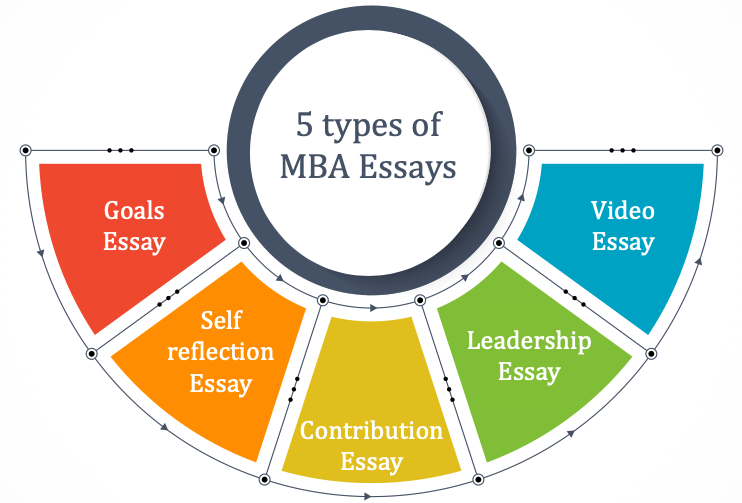
MBA essay is a powerful means for you to showcase your worth to your target business school. It holds a 15% weightage in your application. The essay in MBA applications gives you a chance to showcase those aspects that you’re unable to show in your resume.
But, what are the various ways in which admissions officers use the MBA essay to evaluate your candidacy?
In this article, we’ll explore the 5 types of MBA essays that you can expect to answer through your MBA applications.
Here are the 5 types of MBA essays typically asked in a business school application:
- MBA essay 1 – Goals
- MBA essay 2 – Self-reflection
- MBA essay 3 – Contribution
- MBA essay 4 – Leadership
- MBA essay 5 – Video

Let’s look at each one of these five types of MBA essays:
Goals Essay
This is one essay that you can expect to see in most schools’ MBA applications. The purpose of this essay is to understand your motivations for coming to business school and your plans thereafter. The question comes in all kinds of variants and word limits.

For example, Wharton has a 500-word question on this, whereas Tuck has a 300-word question on this. MIT Sloan , on the other hand, does not ask you about your goals at all. Some schools ask you to also talk about why you are interested in their specific program, as part of the same prompt.
Some examples of such MBA essays include:
- Booth : How will the Booth MBA help you achieve your immediate and long-term post-MBA career goals? (250 words minimum)
- Darden : What is your short-term, post-MBA goal and why? (150 words)
Here are articles on MBA essay analysis for 2021 admissions for a few top US business schools:
- Harvard Business School
- Stanford GSB
- Chicago Booth
- Dartmouth Tuck
- Michigan Ross
- UC Berkeley Haas
Values, Identity, Personal Qualities, and Self-Reflection Essay
This is a broad category that encompasses several different kinds of MBA essays. For example, some schools ask you to introduce yourself to your classmates (e.g. HBS, UT Austin). Answering such a question would require you to introspect.

On the other hand, for over a decade, Stanford GSB required applicants to talk about what matters most to them and why. Such questions require deep introspection in order for you to get to the core of your personality and influences. Such essays could also include failure essays or essays that ask you to talk about an ethical dilemma that you might have faced. Many schools have a variant of this kind of essay.
- Kellogg : What values are important to you and how have they influenced you? (450 words)
- Yale : Describe the biggest commitment you’ve ever made. (500 words)
- Tuck : Tell us who you are. (300 words)
Here are detailed articles on MBA essay analysis for 2019 – 2020 admissions for a few top European business schools:
- London Business School
- Oxford Saïd
Contribution Essay
Student-led activities are at the forefront of most schools’ culture. Consequently, an active student body is imperative for the success of student life initiatives.

The contribution essay in MBA applications is a great way for schools to assess what applicants might bring to the table. Some examples of such essays include:
- Wharton : Describe an impactful experience or accomplishment that is not reflected elsewhere in your application. How will you use what you learned through that experience to contribute to the Wharton community? (400 words)
- ISB : There will be 900 students in the class of 2021. Why should you be one of them? (400 words)
Leadership, Achievements & Impact Essay

In this type of MBA essay, you usually have an opportunity to share a positive anecdote from your past to communicate your future potential to the admissions committee.
- Darden : Please provide an example of a situation in which you made a meaningful impact (200 words)
- INSEAD : Describe the achievement of which you are most proud and explain why
Video Essay
Video essays have been a relatively new innovation. These essays have an important distinction in that you may either have an opportunity to do retakes and submit your response in a considered manner or record your video impromptu.
These essays could demonstrate your executive presence and ability to think on your feet. These could give the admissions committee a chance to assess softer aspects of your candidacy like body language, communication skills, and presence of mind.

- MIT Sloan (pre-recorded): Please introduce yourself to your future classmates via a brief 60-second video statement.
- Kellogg (impromptu): What are your career aspirations? How will you fulfill them and how will Kellogg help you?
Helpful MBA Essay tips
The above list is not a mutually exclusive cumulatively exhaustive (MECE) list of MBA essays. The idea here is to introduce you to the different kinds of MBA essay questions.
I have seen cases where an applicant can come across as a totally different person from one school to another simply on the basis of the essay questions asked and the responses to those questions.
While applying, you may experience that the application process can be taxing. In this time of duress, you may be tempted to recycle content from one school’s MBA essay in another place.
In those cases, I recommend that you resist the temptation and write a new response, catered to the specific essay prompt for the business school, even if leveraging the same anecdote. This would allow you to put your best foot forward.
About the author
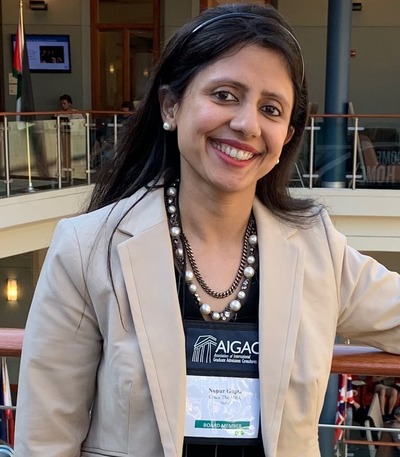
Nupur Gupta is a Wharton graduate and also the recipient of the Wharton India fellowship. She serves on the board of the US-based non-profit AIGAC, i.e. the Association for International Graduate Admissions Consultants. Nupur is also the founder of Crack The MBA , an MBA consulting firm that has a 95% success rate to leading business schools globally. To get in touch, please send your profile details to [email protected]
Begin your GMAT preparation with the only prep company that has delivered more than 700+ scores than any other GMAT club partner. Achieve GMAT 740+ with our AI-driven tools that you personalized feedback at every step of your GMAT journey. Take our free trial today !
About The Author

Suheb Hussain
Don't limit yourself, don't miss these.

Helpful posts Curated just for you!

You might also like

Browse Related Topics

Achieve 685+ on the GMAT in 30 days!
Sign up for our free trial and get.
400+ Practice questions with detailed solutions
10+ hours of ai-driven video lessons, adaptive mock test with osr+ analysis.
Begin your GMAT Prep today!
Sample MBA Essay for Wharton
James Woodson/Photodisc / Getty Images
- MBA Programs & Rankings
- Business Degree Options
- Choosing A Business School
- Business School Admissions
- Business Careers and Internships
- Student Resources
- Homework Help
- Private School
- College Admissions
- College Life
- Graduate School
- Distance Learning
MBA essays can be hard to write, but they are one of the most important parts of the MBA application process . If you need help getting started, you may want to view a few sample MBA essays for inspiration. The sample MBA essay shown below has been reprinted (with permission) from EssayEdge.com . EssayEdge did not write or edit this sample MBA essay. It is a good example of how an MBA essay should be formatted.
Wharton Essay Prompt
Prompt: Describe how your experiences, both professional and personal, have led to your decision to pursue an MBA at the Wharton school this year. How does this decision relate to your career goals for the future? Throughout my life, I have observed two distinct career paths, my father's and my uncle's. My father completed his engineering degree and secured a government job in India, which he continues to hold to this day. My uncle's path began similarly; like my father, he earned an engineering degree. My uncle, on the other hand, continued his education by moving to the United States to earn an MBA, then started his own venture and became a successful businessman in Los Angeles. Evaluating their experiences helped me understand what I wanted from my life and create a master plan for my career. While I appreciate the excitement, flexibility, and independence my uncle has in his life, I value my father's proximity to his family and culture. I now realize that a career as an entrepreneur in India could provide me with the best of both worlds. With the objective of learning about business, I completed my bachelor's degree in Commerce and joined KPMG in the Audit & Business Advisory Department. I believed that a career with an accounting firm would serve me in two ways: first, by enhancing my knowledge of accounting -- the language of business -- and second, by providing me with an excellent introduction to the business world. My decision seemed to be a sound one; in my first two years at KPMG, I worked on a wide variety of assignments that not only strengthened my analytical and problem-solving skills, but also taught me how large businesses managed their sourcing, manufacturing, and distribution functions. After enjoying this productive and educational experience for two years, I decided I wanted greater opportunities than what the audit department could offer. Thus, when the Management Assurance Services (MAS) practice was established in India, the challenge of working in a new service line and the opportunity to help improve the risk management mechanisms of businesses influenced me to join it. In the last three years, I have improved risk management capabilities of clients by addressing strategic, enterprise and operational risk issues. I have also assisted the MAS practice in tailoring our international portfolio of services to the Indian marketplace by conducting risk management surveys, interacting with professionals in other developing economies, and conducting interviews with senior client management. Besides becoming skilled at process risk consulting, I have also significantly improved my project management and new service development abilities in the last three years.
During my tenure with the MAS department, I have encountered challenges that have motivated me to seek a management degree . For example, last year, we conducted a process risk review for a cash-starved Indian auto ancillary that had expanded capacity without assessing sources of competitive advantage. It was clear that the company needed to rethink its business and operational strategy. Since the MAS department lacked the necessary skills to execute the project, we hired consultants to assist us in the assignment. Their approach of reviewing both the strategic and operational aspects of the business was an eye-opener for me. The pair of consultants used their knowledge of international business and macroeconomics to evaluate key industry trends and identify new markets for the company. In addition, they employed their understanding of supply chain management to benchmark key capabilities with competition and identify opportunities for improvement. As I witnessed the progress made by these two consultants, I realized that in order to achieve my long-term professional goals, I needed to return to school to expand my understanding of the fundamentals of corporate and industry analysis. I also believe that management education can help me develop other vital skills essential to my standing as a professional. For example, I will benefit from the opportunity to further polish my public speaking ability and hone my skills as a negotiator. Also, I have had limited experience working outside India, and I feel that an international education will equip me with the skills necessary to deal with foreign suppliers and customers. After graduating from Wharton, I will seek a position in a strategy consulting firm in its business building/growth practice. In addition to providing me with an opportunity to apply what I have learned, a position in the growth practice will expose me to the practical issues of new business creation. Three to five years after earning an MBA, I would expect to establish my own business venture. In the short-term, however, I may explore exciting business ideas and examine ways to build a sustainable business with the help of the Wharton Venture Initiation Program. The ideal education for me includes the Wharton Entrepreneurship and Strategic Management majors coupled with unique experiences like the Wharton Business Plan Competition and the Wharton Technology Entrepreneurship Internship. Perhaps even more importantly, I look to benefit from the Wharton environment -- an environment of boundless innovation. Wharton will give me the opportunity to apply the theory, models and techniques I learn in the classroom to the real world. I intend to join the 'entrepreneurs club' and consulting club, which will not only help me form lifelong friendships with fellow students but also give me exposure to top consulting firms and successful entrepreneurs. I would be proud to be a part of the Women in Business club and contribute to the 125 years of women at Penn. After five years of business experience, I believe that I am ready to take the next step toward my dream of being an entrepreneur. I also am confident that I am ready to participate actively as a member of the incoming Wharton class. At this point I am looking to gain the requisite skills and relationships to grow as a professional; I know that Wharton is the right place for me to accomplish this objective.
- Letters of Recommendation for MBA Applicants
- Top Ranked California Business Schools
- Understanding the MBA Degree
- Should I Earn a Finance Degree?
- Why Get an MBA?
- MBA Essay Tips
- What Can I Do With a Masters in Business Administration?
- The 10 Best U.S. Business Schools
- Business Administration Education and Careers
- Sample Weak Supplemental Essay for Duke University
- Sample College Transfer Essay
- How to Write and Format an MBA Essay
- MBA in Management
- Common Application Short Answer Essay on Entrepreneurship
- Should I Earn a Business Administration Degree?
- Why Business Students Get an Executive MBA
Wharton MBA Essay Examples
We can improve your MBA profile and boost your candidacy. Gain insight into the review process and eliminate weaknesses from your MBA application.
Note: You must have javascript enabled to submit the form.
Wharton MBA Essay Samples
Wharton looks for exceptional career trajectory, quantitative chops, and demonstrated leadership, teamwork, and interpersonal skills. In recent years, they have worked to deemphasize the GMAT so it’s not quite as rigid as it once was as in order to diversify class. With less emphasis on stats, the Wharton essays are essential to showcasing character and experiences.
Successful Examples of Wharton MBA Essays
Here’s a snapshot of the caliber of expertise on our SBC team .
HBS Admissions Board at Harvard Business School HBS MBA
HBS Admissions Board at Harvard Business School Kellogg MBA
Director HBS Admissions at Harvard Business School MBA, the Wharton School
HBS Admissions Board at Harvard Business School
Director HBS Admissions at Harvard Business School HBS MBA
Admissions Officer at Stanford's Graduate School of Business (GSB) MBA, Stanford's Graduate School of Business (GSB)
Asst Director MBA Admissions at Stanford's Graduate School of Business (GSB) Director MBA Admissions at Berkeley’s Haas School of Business
MBA, Stanford's Graduate School of Business (GSB) Minority Admissions, the GSB Diversity Programs, the GSB
Associate Director MBA Admissions at the Wharton School at the University of Pennsylvania
Associate Director MBA Admissions and Marketing at the Wharton MBA’s Lauder Institute
Director, the Wharton School at the University of Pennsylvania Professional Writer
Assistant Director MBA Admissions at Columbia Business School (CBS) NYU Admissions
Assistant Director MBA Admissions at Columbia Business School (CBS) M.S.Ed, Higher Education, U of Pennsylvania
Associate Director MBA Admissions at Columbia Business School (CBS)
Ashley is a former MBA Admissions Board Member for Harvard Business School (HBS), where she interviewed and evaluated thousands of business school applicants for over a six year tenure. Ashley holds an MBA from HBS. During her HBS years, Ashley was the Sports Editor for the Harbus and a member of the B-School Blades Ice Hockey Team. After HBS, she worked in Marketing at the Gillette Company on Male and Female shaving ...
Kerry is a former member of the Admissions Board at Harvard Business School (HBS). During her 5+ year tenure at HBS, she read and evaluated hundreds of applications and interviewed MBA candidates from a wide range of backgrounds across the globe. She also led marketing and outreach efforts focused on increasing diversity and inclusion, ran the Summer Venture in Management Program (SVMP), and launched the 2+2 Program during her time in Admissions. Kerry holds a B.A. from Bates College and ...
A former associate director of admissions at Harvard Business School, Pauline served on the HBS MBA Admissions Board full-time for four years. She evaluated and interviewed HBS applicants, both on-campus and globally. Pauline's career has included sales and marketing management roles with Coca-Cola, Gillette, Procter & Gamble, and IBM. For over 10 years, Pauline has expertly guided MBA applicants, and her clients h ...
Geri is a former member of the Admissions Board at Harvard Business School (HBS). In her 7 year tenure in HBS Admissions, she read and evaluated hundreds of applications and interviewed MBA candidates from a diverse set of academic, geographic, and employment backgrounds. Geri also traveled globally representing the school at outreach events in order to raise awareness for women and international students. In additio ...
Laura comes from the MBA Admissions Board at Harvard Business School (HBS) and is an HBS MBA alumnus. In her HBS Admissions role, she evaluated and interviewed hundreds of business school candidates, including internationals, women, military and other applicant pools, for five years. Prior to her time as a student at HBS, Laura began her career in advertising and marketing in Chicago at Leo Burnett where she worked on th ...
Andrea served as the Associate Director of MBA Admissions at Harvard Business School (HBS) for over five years. In this role, she provided strategic direction for student yield-management activities and also served as a full member of the admissions committee. In 2007, Andrea launched the new 2+2 Program at Harvard Business School – a program targeted at college junior applicants to Harvard Business School. Andrea has also served as a Career Coach for Harvard Business School for both cu ...
Jennifer served as Admissions Officer at the Stanford (GSB) for five years. She holds an MBA from Stanford (GSB) and a B.S. in Chemical Engineering from University of Illinois Urbana-Champaign. Jennifer has over 15 years experience in guiding applicants through the increasingly competitive admissions process into top MBA programs. Having read thousands and thousands of essays and applications while at Stanford (GSB) Admiss ...
Erin served in key roles in MBA Admissions--as Director at Haas School of Business at UC Berkeley and Assistant Director at Stanford's Graduate School of Business (GSB). Erin served on the admissions committee at each school and has read thousands of applications in her career. At Haas, she served for seven years in roles that encompassed evaluation, outreach, and diversity and inclusion. During her tenure in Admissions at GSB, she was responsible for candidate evaluation, applicant outreach, ...
Susie comes from the Admissions Office of the Stanford Graduate School of Business where she reviewed and evaluated hundreds of prospective students’ applications. She holds an MBA from Stanford’s GSB and a BA from Stanford in Economics. Prior to advising MBA applicants, Susie held a variety of roles over a 15-year period in capital markets, finance, and real estate, including as partner in one of the nation’s most innovative finance and real estate investment organizations. In that r ...
Dione holds an MBA degree from Stanford Business School (GSB) and a BA degree from Stanford University, where she double majored in Economics and Communication with concentrations in journalism and sociology. Dione has served as an Admissions reader and member of the Minority Admissions Advisory Committee at Stanford. Dione is an accomplished and respected advocate and thought leader on education and diversity. She is ...
Anthony served as the Associate Director of MBA Admissions at the Wharton School at the University of Pennsylvania, where he dedicated over 10 years of expertise. During his time as a Wharton Admissions Officer, he read and reviewed thousands of applications and helped bring in a class of 800+ students a year. Anthony has traveled both domestically and internationally to recruit a ...
Meghan served as the Associate Director of Admissions and Marketing at the Wharton MBA’s Lauder Institute, a joint degree program combining the Wharton MBA with an MA in International Studies. In her role on the Wharton MBA admissions committee, Meghan advised domestic and international applicants; conducted interviews and information sessions domestically and overseas in Asia, Central and South America, and Europe; and evaluated applicants for admission to the program. Meghan also managed ...
Amy comes from the Wharton School of the University of Pennsylvania where she was Associate Director. Amy devoted 12 years at the Wharton School, working closely with MBA students and supporting the admissions team. During her tenure at Wharton, Amy served as a trusted adviser to prospective applicants as well as admitted and matriculated students. She conducted admissions chats with applicants early in the admissions ...
Ally brings six years of admissions experience to the SBC team, most recently as an Assistant Director of Admission for the full-time MBA program at Columbia Business School (CBS). During her time at Columbia, Ally was responsible for reviewing applications, planning recruitment events, and interviewing candidates for both the full-time MBA program and the Executive MBA program. She traveled both internationally and dome ...
Erin has over seven years of experience working across major institutions, including University of Pennsylvania, Columbia Business School, and NYU's Stern School of Business. At Columbia Business School, Erin was an Assistant Director of Admissions where she evaluated applications for both the full time and executive MBA programs, sat on the admissions and merit scholarship committees and advised applicants on which program might be the best fit for them based on their work experience and pro ...
Emma comes from the MBA Admissions Office at Columbia Business School (CBS), where she was Associate Director. Emma conducted dozens of interviews each cycle for the MBA and EMBA programs, as well as coordinating the alumni ambassador interview program. She read and evaluated hundreds of applications each cycle, delivered information sessions to audiences across the globe, and advised countless waitlisted applicants.
As a Wharton MBA, I plan to seek opportunities that exploit my strengths contributing to team environments. First, I thrive in settings where I can leverage my broad knowledge base and strong analytical foundation to help solve problems across a number of functions. Similarly, my empathetic style of leadership has been effective in engaging a range of perspectives and voices towards a common goal. Both aspects position me uniquely to take on roles where I can bridge Wharton with the surrounding community.
Dance education is an initiative I’m highly motivated to support, as dance has been an amazing therapeutic outlet for me. The countless hours I’ve spent bhangra dance moves have been both highly meditative and endlessly entertaining. Dance is also perhaps the most powerful unifier of people I’ve ever experienced. All personal differences seem to wash away when people can join around their common love of dance. While at Wharton, I plan to combine my appreciation for performance and excitement to engage with the community by working with Wharton Dance Studio, which brings Wharton students together in a broad variety of styles and and cultures, for events such as the Wharton Dance Studio & India Club’s joint Bollywood Fusion Diwali Dance Workshop. Whether teaching, organizing live events for the community, or even taking the stage as a dancer myself, I am excited about the range of ways I can spread the joy of movement through the Wharton Dance Club.
Another area of personal interest where I intend to contribute meaningfully to the Wharton community is golf. I played golf extensively growing up, but talents lie less on the fairway and more in the front-office. For years, I have maintained an avid interest in the advanced analytics of golf as a scouting / decision-making tool, even going so far as to create my own statistical models. As a widget industry professional, I’ve become well-versed in the emerging technology companies advancing the applications of data analytics to the golf handicap industry. Working with the Wharton Golf Club, I am eager to help lead the Wharton team competing at the MBA Masters tourney at Duke University and the annual Spring Scramble, and I would love to organize teams of Wharton golfers to work with inner-city Philadelphia high school and collegiate kids, helping to promote the adoption of advanced golf statistical handicapping to elevate athletic performance at the amateur level.
My short-term post-MBA goal is to join the Strategy and Operations team at a widget tech firm such as well-known-companies-that-recruit-at-Wharton A and B, to gain experience in creating growth opportunities in digital widgets. Long-term, I hope to become the COO of a widget-tech firm and drive the expansion of widget inclusion, particularly in REGION X where I grew up.
Widget inclusion is in a state of disarray, both in the United States and around the world. While going to college in COUNTRY X, I learned about the struggles migrant workers faced in accessing the widget services they needed. Foreign domestic helpers and construction workers told me how difficult it was to do xxx, yyy or zzz in countries where they lacked institutional ties. I became interested in Widget-tech after seeing widget-tech companies’ potential for expanding inclusion and widget literacy issues.
The Wharton MBA will prepare me to become a leader in the widget-tech industry. In my consulting experience at CONSULTING GIANT X, I have worked primarily with traditional widget manufacturing corporations, and developed expertise in improving risk management operations. I want to use the Wharton MBA to build on my experience while learning about managing operations more holistically across an organization, and developing relationships and expertise in the widget-tech industry.
Wharton’s Strategic Management major and elective offerings will help me succeed in a strategic and operational role. STUDENT 1 (Wharton’2X), recommended the course “Managing the Established Enterprise,” which provides frameworks on generating value and competitive advantages. “Technology Strategy,” taught by Professor Rahul Kapoor, will help me apply this knowledge to the widget industry specifically. Learning more about Professor Kapoor’s research on managing emerging technologies will also help me understand the market applications of new widget technologies.
Beyond the classroom, I will gain hands-on experience through participating in an Independent Study Project with the Widget Center for Innovation. STUDENT 2 (Wharton’2X) told me about her project identifying opportunities for technological innovation for Widgets Inc. Projects like these will provide me with new real-world insight into how technology is transforming conventional widgeting models.
I also plan to use Wharton’s Widget-tech Club to build ties in the widget industry. I will benefit from the community-building event and content development support the club facilitates. I am particularly interested in Career Treks related to digital widgets and manufacturing, and the annual widget-tech Conference. Listening to speakers such as Famous Executive, Strategy and Operations Lead at Widgets-R-Us, who spoke at the 2022 Conference, I will learn from industry leaders who are in roles I someday hope to inhabit. Current club member STUDENT 3 also told me about the club’s focus on member education and how it helped him communicate effectively when networking with widget-tech firms. The weekly lunch-and-learns and alumni fireside chats offered by the club will also deepen my content expertise and credibility in the widget industry.
Speaking with students and alumni showed me the supportive nature of Wharton’s community and I look forward to leveraging Wharton’s global network throughout my career in the widget industry.
When I was in my freshman year of high school, I signed up for the girl’s [sport] team. However, as the tryouts neared, I got cold feet; I had only played [sport] for one year prior to ninth grade. The high school coach was also my gym teacher, and she knew I was supposed to go out for the team. I could not imagine telling her that I had gone back on my word, so I dragged myself to the first practice.
That turned out to be one of the best decisions I have made. My coach gave us individualized cards before every game with that day’s goals—evidence of how deeply she cared for her players. I was a starting player by my sophomore year, and she would make me yell out directions to organize my teammates. This included telling the seniors who to cover, which was intimidating. Her confidence in me translated into confidence in myself, and I went on to play for her in the state championship game my junior year. We were not the most-skilled team in the state, but preparation, dedication and hard work helped us achieve a better record than we would have otherwise.
I continued to play in college, where my experience was completely different. At [College], we barely had enough players to field a team my senior year, so we had to recruit from the women’s [sport] and [sport] teams and other athletic friends. Learning to compete with an eclectic group of women with drastically different skill levels was a challenge. But remembering how to motivate individuals and focus on strengths helped me to succeed as captain.
My experience playing [sport] has shaped my career thus far by helping me to find ways to win in the competitive world of sales and trading and equity research. I know it will affect my contributions to the Wharton community as well. By trying out for the team my freshman year, I learned that I need to put myself out there—even if it’s uncomfortable—to gain new experiences and grow individually. I will be very active in on-campus groups, like Women in Business and Wharton’s Fintech club. Given all of the opportunities to get involved in business school, I understand the dedication it takes to get things like the Women’s Summit across the finish line. [Sport] also taught me how to empower individuals and work with a diverse group of people. By recognizing each person’s strengths, I will not only bring my Learning Team together, but also contribute to a greater sense of togetherness across the teams I am a part of at Wharton.
Finally, I would also like to contribute to the greater Wharton community by helping to coach [sport] locally in Philadelphia. I believe extending my network beyond Wharton’s walls will strengthen my leadership development, and I hope to inspire confidence in other young girls who are just beginning to think about their careers.
I am an avid runner, and am empowered by the physical feats my body is capable of. I share this outlet by volunteering with [Nonprofit], a [Description of Nonprofit]. Most recently, I [Description of achievement]. Reaching this milestone together required teamwork, leadership and commitment to action, all of which I will bring to the Wharton community.
As a team of mentors, we were charged with leading participants through a 10-week training program prior to our big event. Each week, we integrated our different professional backgrounds to appeal to the members’ diverse personalities. May, an outdoor adventure leader, was accustomed to exerting control in chaotic environments and expertly channeled energy into physical activity. June, a special event planner who is used to calming her clients in high-stress environments, easily dug into people’s underlying emotions to understand their excitement or concerns for race day. On my Wharton Learning Team, I will leverage this same collaborative approach to tackling challenges — actively contributing my own perspective and encouraging my teammates to do the same, all while pushing the group to integrate our ideas into the strongest possible response.
As we prepped the girls for the event, I gained a deeper appreciation for how passion develops leadership. I am passionate about our work, but I feel even more strongly about using it to empower the younger community. This heightened sense of purpose motivated me to work through challenges and help our members reach their goals. As a member of Wharton’s PE/VC Club and Wharton Women in Business, I will use my passion for improving businesses through investment and promoting women’s leadership to enhance the clubs’ respective communities and execute events. I am particularly eager to serve as Co-President of Wharton Women in Business and work with my team of Co-Presidents to host the Wharton Women’s Summit.
Finally, inspired by a member of my [Nonprofit] team, I will promote a commitment to action while at Wharton. AAA had struggled to gain her parents’ support during the season, but nonetheless continued to compete with a quiet determination. The day before our big event, she confided in me that she had been apprehensive about being able to do it, knowing that her parents would not be among the supporters. However, she also revealed her excitement to compete and to share in the success of her friends. Their collective hard work superseded her fears. Wharton’s campus celebrates the same type of commitment to action on behalf of others that AAA so maturely displayed that day. I will channel this practice by serving on the Deans’ MBA Advisory Council, deepening my understanding of the diverse initiatives of my peers, and then promoting their interests across the broader community. I aim to augment Wharton’s culture of sharing in each other’s successes, just as AAA did for our team.
In my Research role at [Company], I cover industrial companies that have been around for decades. I’ve noticed that in these organizations, the most exciting work is being done in the newer, software-led divisions. That’s why after graduation, I would like to expand my knowledge of new technologies in a digital transformation consulting role at a firm like Bain or BCG. Ultimately, I would like to be COO at a financial services or fintech company like PNC, Paypal, or Betterment.
To reach these goals, I hope to gain a better understanding of operations to complement my finance background. Classes in Wharton’s Operations, Information and Decisions department, such as “Information and Business Transformation” and “Enabling Technologies,” would provide a strong foundation and help me be in on the conversation about how businesses of the future will be run. Joining the Fintech club will increase my exposure to smaller growth companies and developing technologies, while allowing me to network with likeminded students.
Wharton can also help me develop the skills necessary to succeed in an upper-management position. I would take “Managing the Emerging Enterprise” to learn how to not only retain and attract talent, but also improve organizational processes. Further, I know I would benefit from taking classes with Adam Grant and Stew Friedman in particular. “Negotiations” would help me build a critical skill, and “Executive Leadership” would give me the tools to become a better leader inside and outside of work. I am also eager to learn how to encourage employees to bring their “whole self” to work.
I plan to network with [Alum] co-founder and CEO of [Company], and ask him about his experience running a fintech company and the impact his platform has had on smaller business.
[Alum], [Company] founder, is another alum I would like to connect with. I want to know how he grew his company and how customer demands have changed over the last few years as data analysis has become more mainstream. I am also interested in learning about investor’s openness to using this information to make investment decisions.
Finally, I intend to join Wharton Women in Business to network with classmates and industry leaders. I also hope to assist in organizing the Wharton Women’s Summit and bring inspiring female trailblazers to Philadelphia to share their experiences and accomplishments. I believe broadening my perspective through leadership expeditions and my classmates’ experiences will make me a more effective leader. Wharton’s diverse alumni network, leadership programs and faculty will help fill the gaps in my background and put me in the best possible position for a job in a digital consulting and ultimately for a COO role at a fintech or financial services company.
I love traveling to interview potential investment targets’ management teams; I have talked with executives at organic food producers, auto manufacturers, concrete block fabricators, and 30 other unique businesses. However, I have yet to encounter more than one woman serving in a senior-level position. I need a Wharton MBA to change this statistic.
In the short term, I will use my MBA to transition to a private equity investment role at a multinational investment firm like Carlyle, Blackstone or KKR. By capitalizing on Wharton’s advanced elective finance classes, I hope to sharpen my analytical proficiency and deepen my investment strategy knowledge.
I will complement the core’s rigor with electives such as The Finance of Acquisitions and Buyouts, which will expose me to real-world investment scenarios and improve my understanding of nuanced transaction-related details. Further, Wharton’s Learning Team model will enhance my perspective as I work with my team to incorporate our diverse backgrounds into problem solving. As [Alum] has proved, Wharton is unmatched in developing well-rounded investors and teammates.
Ultimately, I hope to leverage the leadership skills I develop at Wharton to land an executive position in the private equity division of a global investment firm. I intend to use my platform to campaign for the promotion of women to leadership positions across the industry. Through courses such as William Lauder’s Decision-Making in the Leadership Chair, I will have direct exposure to C-suite professionals and learn how to both position myself for a similar role and overcome challenges once in the position.
At the Diverse Perspectives on the Wharton MBA event in NYC, [Alum] recommended Stew Friedman’s Total Leadership to learn how to think about personal and professional fulfillment. I developed a greater appreciation for the role fulfillment can play in women’s career decisions while serving on a women’s initiative task force at [Company]. This course will be instrumental in achieving my future goal of campaigning for more female industry leaders.
I also intend to put classroom lessons into practice by serving as a Venture Fellow. I am intrigued by [Alum]’s role as a Fellow for the Andes Leadership Venture, which she detailed during conversation at an Admissions event in NYC. Just as she applied learnings from this experience to her role at the [Organization], I will do the same as an executive within a global investment firm.
Wharton’s clubs will further contribute to my development. Wharton Women in Business will serve as an excellent platform to refine my knowledge of women’s professional challenges across industries, and the Wharton Private Equity & Venture Capital Club will expose me to the diverse investment backgrounds of my peers. I also intend to serve as a Co-Chair for the PE/VC Conference, and I will use the opportunity to expand my network within the investment industry.
Wharton will help me develop the nuanced thinking and bold leadership necessary to incite change for women across the financial services industry.
My long-term goal is to combine my experience in finance and my passion for technology by starting and leading a technology company in China as a CFO. I developed an appreciation for technology companies during my time with Firm Q. I always believed they help to boost innovative ideas and make great products affordable to people from all walks of life. When I later moved to Bank, I got to know these companies more in-depth through working in the leading technology research team. I came to understand that business and innovation often go hand in hand. I want to lead a technology start-up of real social impact and propel innovation with the power of finance.
To achieve this goal, I intend to first earn an MBA and then work in Investment Banking M&A covering the technology sector in a major bank such as Goldman or Morgan Stanley after graduation. Working in the primary market would allow me to look at the technology industry from a different angle and help me be more prepared for my ultimate goal of building one of these companies.
Wharton gives me access to the tools I will need to succeed. Distinguished alumni such as Person 1 and Person 2 have spoken at length about their Wharton experiences. At Wharton, I will not only gain the knowledge needed for a leadership role in a tech start-up, but also attain deeper understanding of finance and how it functions inside and outside start-ups. Courses such as Venture Capital and Finance of Innovation, International Corporate Finance, Entrepreneurship through Acquisitions, and Enabling Technologies will provide me with insights into how finance connects with technology start-up companies in a global setting.
The role I envision for myself is that of a CFO. However, startups don’t often have the luxury of a full executive suite so I will need to sharpen my leadership and knowledge application capabilities. Speaking with ’17 student Tracy and attending info sessions, I got excited about Wharton’s broad array of courses and extra-curricular activities that emphasize leadership. Courses such as Managing the Emerging Enterprise and the Executive Coaching and Feedback Program will be central to developing my leadership skills. Besides, the Mack Institute for Innovation Management is an excellent platform for me to apply knowledge learned in management courses and develop practical approaches. In addition, I am extremely interested in the Global Immersion Program, which could offer me valuable insights through practical experience of direct interaction with local business leaders, managers, and government officials.
Outside the classroom, I will take leadership roles in the Technology club and Entrepreneurship club, where I will connect with students of similar belief and passion. Moreover, the strong Wharton alumni network in China also sets a solid foundation for my long-term career development.
Wharton is the school that not only helps me achieve my short-term goal, but also prepares me for my long-term goal by providing knowledge across subjects, leadership and immersive application training, extra-curricular activities, and community.
When I was twelve, I traveled alone to California to visit my mom’s former colleagues. While enjoying my first cup of Starbucks, I introduced Chinese traditions such as green tea and Beijing opera into these foreigners’ lives. As a Chinese girl who inherited traditional cultural values yet has also obtained a global viewpoint from living in Hong Kong and many visits to the U.S., I will contribute to Wharton by blending the western and eastern cultures and enhancing communication between both sides.
In the classroom I will contribute my deep accounting and finance knowledge and insights into the technology industry such as Apple’s supply chain competitive landscape. My international background and global perspective will allow me to provide the class with fresh angles to approach problems. In learning groups I will contribute to discussion and teamwork by playing various roles including teammate, motivator, and leader. My previous experience working with international teammates at Firm A and Bank Z strengthened my teamwork and communication skills.
In student clubs, I will contribute through taking a leadership role in the Technology Club and leveraging my contacts with technology companies and experts. For example, I could invite the CEO of StartUp Q, a leading Chinese artificial intelligence player, to talk about AI development trend. I will also join the Asia club as an officer and help with organizing the annual Asian Business Conference. I successfully organized the ABC Conference under the competition started by Wharton and the World Bank. I also attended the Harvard JKL Conference as a delegate. These experiences make me prepared to lead and contribute to the club. As an experienced student club leader, I will use my skills to identify merits in each teammate, utilize their strengths, and motivate the team.
Lastly, I want to contribute through community service. Specifically, I will apply to the Wharton Nonprofit Board Leadership Program. My commitment to community service started during college when I founded a social enterprise aimed at helping underprivileged families in Hong Kong bringing their handcrafted products to market. I worked at a Non Profit, 123 Health, on the project planning team at Uni. I am ready to contribute, and also excited to learn more Board skills at Wharton.
My perspective has been shaped by experiences spanning three different countries, and I am committed to sharing my unique experiences with the diverse Wharton community.
My long-term plan is to launch a company focused on providing solutions that allow teachers to tailor academic content to students based on their individualized needs. I have been involved in the education sector for many years, as a tutor throughout high school and college, and currently as a board member for Los Angeles Teach for America. I have long been interested in educational technology given its potential to dramatically alter the engagement level and overall learning process for students and enhance the education system. To achieve this goal I first need an MBA and an initial strategic planning role in an early stage education technology company, such as ABC Learning or Real Knowledge, where I will gain more experience in the industry, develop better cross-functional skills, and learn how to build a young business. Wharton is the first step on my journey.
While my undergraduate education and professional experiences have provided significant practice in the fields of finance and accounting, I will expand that exposure at Wharton across the full spectrum of other business functions such as strategy, sales and marketing, and operations. Courses such as Professor Siggelkow’s Strategy and Competitive Advantage will teach me to build competitive advantage for an enterprise through strategic decision-making, a key topic to meet my near-term career objectives. Entrepreneurial-focused learning like the Formation and Implementation of Entrepreneurial Ventures class will help as well, as I’ll learn to build and implement an effective start-up business model. Outside of the classroom, Wharton’s Entrepreneurship Club will offer exposure to different ideas and business plans developed by classmates, provide the opportunity to connect with alumni and learn from their entrepreneurial experiences, and serve as a network for potential funding sources down the road. Across both classroom and extracurricular activities I am excited to learn from the varied and diverse experiences of my peers in the Wharton community and benefit from their unique perspectives.
Personally, a Wharton MBA will further enhance my softer management and leadership skills. I am excited to take Foundations of Teamwork and Leadership which will allow hands-on development and application of these skills from the very beginning in Pre-Term. I also plan to serve as a Board Fellow in the Nonprofit Board Leadership Program, which will combine an interactive leadership learning opportunity with the ability to give back to local non-profit organizations – a continuation of the non-profit board work I have enjoyed over the last several years. Taking on a leadership role in the Entrepreneurship Club will give me additional experience leading a group of my peers and increase my engagement in the entrepreneurial community at Wharton. Lastly, I look forward to developing strong relationships with classmates during the program and with other Wharton alumni more broadly. The unique talents of classmates and global reach of Wharton’s deep alumni network will provide an invaluable source of ideas, resources and guidance throughout my career and entrepreneurial endeavors. Ultimately, Wharton serves as the ideal platform for me to continue my professional and personal development to achieve my career goals.
To me, academic engagement encompasses the whole Wharton learning community. I see myself contributing through the classroom, clubs and volunteer organizations.
In the classroom, I will help my learning group going through the fixed core because of my academic background and my professional experience in finance and consulting. My college coursework includes honors econometrics along with undergraduate and graduate level courses in regression analysis. This background will allow me to help my group as we go through Regression Analysis for Managers. Additionally, my professional experience will be valuable in Marketing Management which covers customer segmentation and pricing strategy, among other topics. As a consultant, I worked on several growth strategy projects based on customer segmentations. At ABC Private Equity, I helped develop pricing strategies for various businesses including a dental lab, a chain of ambulatory surgery centers and a software company. My professional experience will help me contribute to classroom discussion in elective courses outside the fixed core. For example, I plan to take Negotiation and Dispute Resolution. At ABC Private Equity, I negotiated reimbursement rate increases with health insurance companies and a multi?company deal for document printing services with a print vendor.
I also plan to contribute through leadership roles in student clubs such as the Healthcare Club. I believe that I could leverage some of my contacts in the healthcare industry to help organize a speaker series for this group. I could reach out to Mike Jones , a former president of XYZ Healthcare, to speak about the implications of healthcare reform legislation. I am working closely with Mike to develop a reimbursement management strategy for our clinical lab business.
I would also seek an officer position with the Technology Club. My experience creating web applications including a procurement management app and a pricing calculator for a dental business will make me a valuable addition to that club; I can help students from non?technical backgrounds become conversant in programming concepts.
Finally, I would like to contribute through volunteer activities. I will apply to the Wharton Nonprofit Board Leadership Program, and hope for a board position at a nonprofit focused on child/teen education. I firmly believe in the value of education and this has led me to help educate others. This started in college, where I worked as a calculus teaching assistant and continues today. I currently volunteer, through DEF Scholars, as a mentor helping underprivileged high school seniors apply to college. I also volunteer with XYZ Tutoring, a nonprofit providing free ACT prep to Chicago Public School students. At XYZ, I lead a team of three programmers building a web portal for students to take practice tests.
Wharton brings together students from diverse backgrounds to create a pool of complementary knowledge, talent and connections that all can draw from to accomplish their goals. Everyone must be willing to give into the pool. I value this dynamic and am committed to contributing.
Professionally, I want to further develop skills needed to achieve my career goals. My short term goal is to join a corporate strategy team at a large healthcare company. Subsequently, I would transition into a management role at one of that company’s business units. I would then pursue a CEO position at a mid?size healthcare IT business such as Vitera Solutions. I grew up close to someone with a chronic illness. This situation created turmoil in my family and eventually led to my parents divorce. The condition eluded effective treatment until one doctor found a combination of six drugs that brought the symptoms under control. This experience motivated me to pursue a career in healthcare and particularly healthcare IT, where data mining can be used to identify novel treatment combinations. To reach my career goals, I need to refine my leadership and analytical skills.
Ive demonstrated leadership potential through projects inside and outside of work but need to further develop as a leader to be highly effective in corporate strategy, as a manager, and as a CEO. I would accomplish this at Wharton through coursework and extracurricular activities. Specifically, I would take courses focused on leadership including Executive Leadership and Advanced Persuasion. Outside the classroom, I would take advantage of the Executive Feedback and Coaching Program. I would also participate in the Tall Ship Sailing leadership venture, first as a participant and then, hopefully, as a venture fellow.
At Wharton, I would improve analytically by learning to better apply academic theory to business problems. I studied economics and mathematics at the University of Chicago. Whereas Wharton’s philosophy is Knowledge for Action, the University of Chicago’s could best be described as Knowledge for Theory. This training gap has prevented me from fully utilizing economics/statistics to solve business problems. I would address this at Wharton through collaboration with other students and faculty on research projects. For example, I would apply for a Mack Institute Research Fellowship to explore novel ways to use patient data to improve healthcare outcomes.
Personally, I want to make close friends who share my interest in business. I met most of my close friends in college. Very few went into business. I could build similarly close relationships with other students at Wharton through my core learning group and student clubs. I have been impressed with the professional aptitude and personal qualities of the Wharton alums that I have met in my career and would be excited to build friendships with others like them. As an example, I worked on a project with John Smith (WG 99), an executive at CDE Medical. John is not only one of the smartest guys I have ever met, he is also one of the nicest.
Wharton is the only program that can help me attain my professional and personal goals: developing skills inside and outside the classroom to be an executive of impact, and forming networks and lasting friendships with like?minded individuals.

SBC’s star-studded consultant team is unparalleled. Our clients benefit from current intelligence that we receive from the former MBA Admissions Officers from Wharton, Columbia CBS and every elite business program in the US and Europe. These MBA Admissions Officers have chosen to work exclusively with SBC.
Just two of the many superstars on the SBC team: Meet Anthony , who served as the Associate Director of MBA Admissions at the Wharton School at the University of Pennsylvania, where he dedicated over 10 years of expertise.
Meet Erin , who has over seven years of experience working across major institutions, including University of Pennsylvania, Columbia Business School, and NYU’s Stern School of Business.
Tap into this inside knowledge for your MBA applications by requesting a consultation .
You May Also Like

4 Things Wharton Looks For in MBA Applicants

Leverage your Banking Resume to get an MBA at Harvard, Wharton or Stanford

How to Get Into Harvard Business School
7 qualities of the ideal wharton mba, learn about our all-in service, meet the sbc consulting team.
(323) 934-3936 info@StacyBlackman.com
Latest Blog Post
Admissions advice for mba applicants with disabilities.
Assembling a diverse MBA class is a top priority for most business school admissions officers. In addition to gender, ethnicity, race, sexual orientation, and socio-economic considerations, MBA applicants with disabilities are also warmly welcomed. ... →
- Jenkins MBA Home
- Business Analytics (certification)
- Financial Management
- Innovation Management
- Marketing Management
- Supply Chain Management
- Technology Entrepreneurship and Commercialization (TEC)
- Full-Time Employment Data
- Working Professionals: 2021
- Financial Services
- Manufacturing
- Job/Internship Openings
- Full-Time MBA Students
- Working Professional MBA Students
- Upcoming Events
- Career Documents
- Company SWOTs
- International Resources
- Online Resources for Current Students
- Diversity Conferences Introduction
- Diversity Conference Reimbursement Stipend
- Jenkins MBA Corporate Partners
- Corporate Support Opportunities
- Engage With Us
- Recruit Our Students
- Recruit Our Students: International Students
- Contact CMC
- Full Time Employment Data
- Working Professionals: 2022
- PCOM Career Center
- Career Center Team
- MBA Coaches
- Facts and Rankings
- Jenkins News
10 Best Sample Answers to “Why Do You Want to Work in Our Company?”
- Share This: Share 10 Best Sample Answers to “Why Do You Want to Work in Our Company?” on Facebook Share 10 Best Sample Answers to “Why Do You Want to Work in Our Company?” on LinkedIn Share 10 Best Sample Answers to “Why Do You Want to Work in Our Company?” on X
10 Best Sample Answers to “Why Do You Want to Work in Our Company?” was originally published on WikiJob.
If you’ve been invited to an interview, you can expect to be asked some variation of the question, “Why do you want to work in our company?”. People often dismiss this as a trick question, or assume that the interviewer is only looking to hear how great the company is. Yet it is arguably the most significant question an interviewer can ask you.
It is also extremely difficult to answer well. This article will outline exactly what your interviewer is looking for, typical mistakes candidates make, how to prepare your answer and similar versions of the question.
Why Do You Want to Work in Our Company? – What Is the Interviewer Really Asking?
When you are faced with the question ‘Why do you want to work in our company?’ you may feel overwhelmed. However, your interviewer isn’t going to ask you to recite all of their industry awards from memory. Nor do they want you to feed them empty compliments.
The interview is about you. Your interviewer wants to know:
- Why you are perfect for the role
- What motivated you to apply
- How you will fit into the company’s culture
- Whether you understand the company’s strategy and commercial goals
- Whether you are likely to stay at the company for a long time
You need to structure your answer in two parts:
- Why do you want this particular job?
- Why do you want to work at this particular company?
We will unpick these questions below, but first, let’s look at some example answers from job experts:
Why Do You Want to Work in Our Company Sample Answers
Use the below examples to help you pull together your own answer. Remember to structure your answer in two parts, and bear the above points in mind.
Example Answer 1
I applied for the position of E-commerce Marketing Assistant because I am looking to kick-start my career in digital marketing.
As a graduate specialising in digital marketing, I have expertise in promoting online brand awareness.
Whilst at university, I volunteered for a charity by promoting regular bake sales. I used social media to garner attention and boost sales. In fact, our Students’ Initiative raised the highest amount for the charity in four years.
I want to work for [company] because I am interested in your product, a meal plan subscription service. As a keen foodie who is always too busy to cook, I have an in-depth understanding of your target audience.
Why this answer is good:
- They linked their skills and interests to the job role.
- They understood the company’s product and explained why they want to work for this particular company.
- They backed up their answer with examples.
Example Answer 2
Two years ago I spent six weeks volunteering with disabled children in Vietnam. This inspired me to train as a teacher because I firmly believe that education is a right every child deserves.
I want to start my Post-Qualification Employment at this school because it has an excellent reputation for ensuring no child is left behind. You have an outstanding Special Educational Needs policy and the teachers here are passionate about encouraging every student to reach their individual potential. This is all reflected in your annual performance scores.
- They explained their reasons for wanting the position and backed this up with examples.
- They gave reasons for admiring the school and demonstrated they share the same values.
- They have done their research by mentioning specific policies.
Example Answer 3
I am drawn to this position of Media Sales Assistant because I am interested in the marketing side of medicine. My degree is in medical biochemistry, so I am knowledgeable about the medical industry and the principles of ethics that are relevant to medical advertising.
I want to work here because [company] has an impressive reputation for working with the major medical journals, and you offer an excellent opportunity to develop expertise within the medical advertising sector.
I understand [company] is looking to grow its client base. I am a very sociable person so I would love communicating daily with clients and building new client relationships.
- They linked their skills to the job role.
- They outlined why they are interested in the position.
- They stated why they want to work for this company in particular.
Example Answer 4
Ever since I was a small child, I have loved math. I was the kid in school who would ask for extra math homework and I used this passion to help guide my choice when it came to exams and college choices.
Now that I am fully qualified as an accountant, I am hoping to direct my passions in a way that is beneficial to others. I feel that your company and this junior position will be the best ways for me to grow in knowledge about the industry as well as enable me to launch a successful career.
- The background information indicates that this is a long-term passion of yours and something you are very interested in
- States qualifications
- Talks about growing within the company which indicates long-term plans
Example Answer 5
When I was a teenager, my dog got really sick. My parents couldn’t afford to pay for visits to the vet, so I researched and studied everything that I could to help improve the situation.
Through my research and actions, my dog eventually got better. This inspired me to study to become a vet and I am passionate about providing affordable and free veterinary care to people who desperately want to provide for their animals but are unable to.
I feel that your service here at the shelter is exactly what I am looking for to help provide treatment to as many animals as possible.
- Talks about strengths such as the ability to use initiative
- Shows the potential employer that you have researched them before your interview
Example Answer 6
Every step of the way throughout my career, I have known how important it is to learn from people who have more experience and expertise than I do. This is why, when I began looking to take the next step in my career, I researched your company.
What you do here, in terms of marketing, is bigger than anything I have tackled before. It is also the logical next step for me. Your reputation for nurturing and building up individuals to help them find and grow their strengths is exactly what attracted me to the role.
- The background shows that you are willing to learn and grow as a person and an employee
- Shows that you have researched the employer
- Talks about what attracted you to the role and how you think this will help you as an employee and an individual
Example Answer 7
I have been a doctor within a hospital setting for several years now. Although I have loved treating patients and the atmosphere that a hospital setting brings, I feel that it is time for a challenge.
I feel that moving into general practice will provide a wider variety of patients and help me to maintain the level of patient care that I want to provide.
This particular practice is well known for patient satisfaction and I feel that I would be a valuable member of the team.
- It talks about your background and expertise
- It states what it is that you hope to gain through your new role
- It talks about what you can bring to the position
Example Answer 8
Your company is well known in the business world for its ability to nurture individuals and help them to reach their full potential. It is especially well-known for helping those who may not have had the opportunity to attend university and gain formal qualifications. This is why I think that I would be a good fit here.
Although I don’t have all of the formal qualifications, I have worked to expand my knowledge and create a foundation in this area. I feel that I can lend my skills well to this role and the nurturing environment will help me to improve across all areas.
- It shows the employer that you have researched their company and understand their values
- By talking about the things that you have taught yourself, you are showing that you are motivated and keen to learn new skills
- You are explaining how you feel that a role within the company could be beneficial to you.
Example Answer 9
I am passionate about providing a customer service experience that leaves the customer smiling and means that they are more likely to return.
This store, in particular, is widely recognized for its exceptional customer service. I feel that our values are similar and this is an environment I would be very happy working in.
- It talks about your strengths
- It speaks about how your values align with those of the company
- It paints the company in a positive light
- It talks about how you can have a positive impact on the company
Example Answer 10
I have been watching this company for quite a while now, admiring the work that you do and keeping an eye on changes in the industry. You always seem to be ahead of the curve, so I have used your work as inspiration to keep me motivated.
Everything that I have learned so far has been self-taught and when I saw that you had a vacancy available I knew that I had to apply. I feel that I would fit well with the work ethic and values here, adding my personal style to the team dynamic.
More than anything, working here would be a dream and a culmination of years of quietly watching from the sidelines.
- It shows that you have had an interest in the company for a while and understand what it is that they do
- It talks about how the values of the company have already helped you in the past and how you would anticipate this to carry on in the future
- It shows that you have been waiting for an opportunity to join the company
How to Prepare for the Question “Why Do You Want to Work in Our Company?”
Now you know how not to answer, it’s time to prepare your best response to ‘Why do you want to work here?’. Here are some tips:
1. Think About Why You Want This Job in Particular
Research the role and figure out why it interests you. Think about how the job description matches your skill set, ambitions and what you genuinely like most about the business.
For example, some of these may apply:
- The responsibilities of the role align with your personal interests. Ensure you can link what interests you about the job role to specific examples. For example, if you are applying for the role of Editorial Assistant at Love Knitting Magazine, you could mention that you are a prolific knitter and you edited a student magazine at university.
- Opportunities for progression. For example, internal qualifications, networking opportunities or management training schemes.
- You want to work in a professional, team-oriented environment which values collaboration and knowledge sharing.
- You love analytical and logical problem-solving.
Example answers related to why you want the job:
- “I want to work here because this organization’s values align with my own. I’m impressed with the work you do to improve patient outcomes and enhance the quality of care. I believe that this is a place where I can make a meaningful contribution to the healthcare field while also growing and developing my skills.”
- “This role is an excellent fit for my skills and experience. I am confident that I have the necessary technical skills and knowledge required for the role, and I’m excited about the opportunity to take on new challenges and responsibilities.”
- “I’m excited about the opportunity to work with a team of highly skilled and dedicated healthcare professionals. From my research on this organization, I can see that you place a strong emphasis on collaboration and teamwork, and I believe that this is an environment where I can thrive and make a positive contribution.”
2. Think About Your Career Goals and How They Align With the Company’s
A short-term career goal might be to gain more experience in customer service. Whereas a long-term goal might be to aspire to a management position. Make sure your career goal is relevant to the job role.
Here are some examples of how you can link your career goals with the company’s objectives:
- For the role of Product Designer – The company makes a product which has inspired you to enter the industry and your career goal is to design similar products.
- For the role of Healthcare Assistant – You are passionate about providing exceptional healthcare and you always aspire to improve your level of care. This is also a value prioritised by the company.
- For the role of Private Client Paralegal – You value developing close professional relationships with clients and your goal is to build a legal career in private client work.
Example answers related to your career goals:
- “I want to work here because I believe this company is at the forefront of innovation in the industry, and I’m passionate about being a part of a team that’s shaping the future of healthcare. This aligns with my career goal of continuously learning and growing while contributing to an organization’s success.”
- “I’m excited about this opportunity because I believe that working for this company will help me achieve my career goal of becoming an expert in my field. The company’s reputation for providing high-quality care and emphasis on continuous learning aligns with my personal and professional goals.”
- “I’m eager to work for this company because I believe it offers excellent career development opportunities. My career goal is to advance into a leadership role, and I know that this company has a track record of promoting from within and investing in their employees’ growth.”
3. Think About Why You Want to Work at This Company in Particular
Make sure you read the company’s website and any news articles you can find. A company’s blog can also be useful, since it will list important projects the company has worked on and focus on topics which are of value to the company.
If you have any connections within your network who have worked with the company, it’s also a good idea to speak with them to find out more about the company from someone who has experienced it first-hand.
Some other ideas to think about when undertaking your research are:
- Why you admire the company – Is it a front-runner in developing a ground-breaking software? Or is it one of the only companies in the country which specialises in aviation law? Make sure your reasons are specific to demonstrate you have done your research.
- Has the company undertaken any projects that particularly interest you, and why? – As well as the company’s blog, check whether they have listed any case studies on their website which provide more insight into the work they do.
- Can you identify the company’s short and long-term objectives? – A short-term objective might be to reward employees who volunteer for the company’s corporate social responsibility programme. A long-term objective might be a target for the number of annual employee hours dedicated to corporate social responsibility.
- What are the company’s values? – For example, a bank might foster a culture of sustainable lending. Or a healthcare organisation might promote their staff’s caring and attentive approach to their work.
Example answers related to the company:
- “I’m excited about working for this company because of its excellent reputation in the industry. I believe that working for a well-respected and established organization will give me access to opportunities and experiences that will help me grow my career.”
- “I’m passionate about the company’s mission to improve patient outcomes and provide high-quality care. This is a purpose that resonates with me, and I’m eager to be a part of a team that’s making a positive impact on people’s lives.”
- “I want to work here because I’ve heard great things about the company culture and the supportive work environment. I believe that working in a positive and collaborative atmosphere will allow me to perform at my best and contribute meaningfully to the team.”
Why Do You Want to Work in Our Company? – Five Typical Mistakes Candidates Make
Before delving into how you answer the ‘Why do you want to work here?’ question, here is some advice on how not to approach it.
Most interviewers will not appreciate a humorous answer. It makes you appear insincere or suggests that you don’t know how to answer the question.
I’m only here for the money.
You look like you could use my help.
2. Ambiguity
The interviewer doesn’t want to hear vague compliments about how their company “looks really cool”. Ambiguous answers will indicate that you haven’t done any research on the organisation or thought about why you want the job at all.
I just think the work looks fun.
3. Not Relating Your Answer to the Job or Company
It is surprising how often candidates forget to mention the job they are applying for altogether.
I liked your website.
You have bean-bag chairs in the break area, which is a nice touch.
4. Being Too Honest
Even if you’re just here for the money, don’t confess this to your interviewer. Never lie, but keep your answer focused on the job role and why you would be a great addition to the company.
I need to pay the rent somehow.
This isn’t my dream job, but it seems tolerable.
5. Saying You Don’t Know
If you cannot come up with a single reason why the company should hire you, they probably won’t.
“Why Do You Want to Work in Our Company” Similar Questions: How They Are Different
There are many variations of the ‘Why do you want to work here?’ question that you may be asked at interview. Here are some examples of similar questions which ask the same thing:
- “Why do you want this job?”
- “What are you looking for in your next job?”
- “Why did you apply for this position?”
However, make sure you listen carefully to the question you are being asked; some will require a different answer than you first expect. Never repeat a pre-prepared response without listening carefully to the question. For example:
“What qualities can you bring to this role?”
This question differs because it focuses less on what you personally think about the role. Instead, talk about your specific achievements and how you can apply your skills to the job.
Example answer:
As well as my ability to manage and administer pension claims, I have a unique background in data management and analysis.
For example, in my previous role, I was part of a project recording and analysing the causes of delayed pension payments. This led to the implementation of improved payment administration policies. I will be looking for opportunities to use my skills within this role.
This answer is good because the candidate has specified a unique skill which will set them apart from the other candidates and backed it up with an example.
“Why should we hire you?”
This question is used to single out the very best of the qualified candidates. We have a whole article about this one question .
The interviewer wants to know:
- Whether you will do the job better than everybody else.
- Whether you will fit into the company’s culture.
It differs from the ‘Why do you want to work here?’ question because it is less about your personal interest in the job and more about what you can do for the company.
Come up with at least three reasons you stand out from the crowd. For example:
- You have experience in this industry;
- Your past achievements demonstrate a proven track record;
- You have relevant awards;
- You have relevant qualifications or further education;
- Your soft skills (such as communication skills) are especially strong (and proven);
- You have specific technical skills (such as knowledge of certain programming languages).
I have over 8 years of experience working with clients to deliver successful projects. As part of this, I have developed great relationships with my clients and other team members.
This contributes to my ability to manage teams and get results. Last year I led a team that won an industry award for a national project.
“How are you a good fit for this company?”
This question differs because it focuses on your understanding of the company’s culture and what skills you can contribute.
Ensure you research the company and its values. Think about how your own goals and values coincide. Then answer the question by:
- Describing your interpretation of the company’s culture.
- Explaining how you fit into that culture (including specific examples).
Here are some ideas to think about when interpreting the company’s culture:
- Does the company value collaboration?
- Does the company value internal progression?
- Are there any mentoring schemes?
- What is the company’s attitude to work/life balance?
I love that [company] promotes supportive attitudes in its employees. At my current job, we also have a culture of support, especially when a tight deadline is coming up.
For example, I recently worked two weeks’ overtime to help a colleague compile the civil disclosure for a massive fraud case.
I love how stimulating and exciting that kind of work can be. Therefore, I think I will fit in well within your team where everyone comes together to work to similar tight deadlines.
Final Thoughts
Preparing to answer interview questions can be daunting, but follow the advice in this article and you will arrive at your interview prepared to impress. Remember:
- Research the company and the position thoroughly.
- Structure your answer in two parts: first, outline why you want the job. Then outline why you want to work at the company.
- Be enthusiastic and back up all your reasons for wanting the job with specific examples.

IMAGES
VIDEO
COMMENTS
You can use the "Why do you want to pursue an MBA" essay to demonstrate your exposure to a wider world beyond your country's borders. Whether it's an educational or a professional experience, you can include it in this essay to show that you are serious about a global career. Additionally, your experience abroad will demonstrate that ...
The "Why MBA" Essay is your chance to convince admissions officers that their school is the perfect fit for what you are looking for in an MBA program. The best essays are both personal and specific. You need to effectively convey what you are seeking from an MBA program and tell the admissions committee why their school will best meet your ...
Example MBA Essays Finally, here are two essays to help inspire you. The first, a personal statement essay, was submitted by an admit to Berkeley Haas' Executive MBA program; the second, a career goals / why MBA essay, was submitted by an admit to Chicago Booth's deferred MBA program.
This collection of 50 successful HBS and GSB essays, with smart commentary, can be downloaded for $60. They are two of the most selective schools, routinely rejecting nine or more out of every ten applicants. Last year alone, 16,628 candidates applied to both schools; just 1,520 gained an acceptance, a mere 9.1% admit rate.
Sample 1: Leadership-focused MBA application essay. This sample is particularly focused on leadership traits. If your essay is about explaining your leadership quality experience, this sample is right up your alley. The best thing about the essay is that it is written in a simple, engaging, and humorous style. It defines a great experience in a ...
EXAMPLE OF 'WHY MBA' ESSAYS. Despite highlighting the do's and don'ts, applicants often make errors in their essays. To assist, we provide examples of successful candidates admitted to top B-schools. These examples can guide you in assessing your standing and applying the mentioned principles systematically.
Highlight your experience in your EMBA essay. An applicant to an Executive MBA program is an executive or manager currently in the workforce, usually with at least eight years of business experience. As an EMBA student you will be expected to excel in your coursework while continuing to hold down your full-time job.
Calculating your MBA Odds and determining your school fit are two totally different things. Step 1: Show the admissions committees you're going to business school for the right reasons. Step 2: Show schools you've really done your research. Step 3: Show them you'll leave the place better than you found it.
8. Fill your essays with plenty of real-life examples. Specific anecdotes and vivid details make a much greater impact than general claims and broad summaries. 9. Demonstrate a sense of humor or vulnerability. You're a real person, and it's okay to show it! BONUS: Don't Make These MBA Essay Mistakes 1. Write about your high school glory days.
2 MBA Admissions Essays That Worked. These outstanding MBA personal statements resulted in admissions offers. MBA admissions officials say they prefer personal statements that convey personality ...
If you are applying to both the MBA and MSx programs, use Essay B to address your interest in both programs. Length. Both essays combined may not exceed 1,050 words. We recommend up to 650 words for Essay A and up to 400 words for Essay B. ... Pertinent examples include: Extenuating circumstances affecting your candidacy, including academic ...
Feature the traits and tell the stories that depict "you" at your best. 2. Sample MBA essays can undermine your confidence in your MBA candidacy. The essays that get published as samples are often truly eye-catching, dramatic, and sensational - stories of exceptional accomplishment, rare feats, or extreme obstacles.
Samples of MBA essays submitted by real candidates who were accepted to Wharton, Harvard, SINSEAD and other top ranked business schools.
Essay Samples When this type of essay, the candidate has to make it clear to the admission committee why an MBA is a crucial step for him in order to achieve his career goals. Mainly you need to explain: What skills you still lack in order to achieve your stated
Avoid jargon and technical language that may be unfamiliar to the reader. Write in a clear and concise manner, using concrete examples to illustrate your points. Use active verbs to make your writing more dynamic. Show genuine enthusiasm and passion for your goals and your desire to be part of the Stanford community.
It is important to truly assess your "personal story" and what makes you unique. Ask yourself what really drives you. Take stock of your true passions. Think about how you are unique from your peers. Consider the circumstances and choices in your life that have shaped you the most.
Check out more Kellogg MBA essay examples! MBA Admission Essays: Sample #4. Prompt from Columbia University: Tell us about your favorite book, movie, or song and why it resonates with you. (250 words) When I first started writing this essay, I began by writing a list of all my favorite books. I had filled about two pages with titles when I ...
Here are the 5 types of MBA essays typically asked in a business school application: MBA essay 1 - Goals. MBA essay 2 - Self-reflection. MBA essay 3 - Contribution. MBA essay 4 - Leadership. MBA essay 5 - Video. Let's look at each one of these five types of MBA essays:
MBA essays can be hard to write, but they are one of the most important parts of the MBA application process.If you need help getting started, you may want to view a few sample MBA essays for inspiration. The sample MBA essay shown below has been reprinted (with permission) from EssayEdge.com.EssayEdge did not write or edit this sample MBA essay.
Stanford GSB Essay Samples. Stanford GSB seeks outstanding and diverse people who seek a transformative experience at Stanford GSB and in turn, seek to transform lives, organizations and the world — that is, to make a significant impact. The GSB is looking for people who will make a big difference and have a better shot than most in being ...
Wharton MBA Essay Samples. Wharton looks for exceptional career trajectory, quantitative chops, and demonstrated leadership, teamwork, and interpersonal skills. In recent years, they have worked to deemphasize the GMAT so it's not quite as rigid as it once was as in order to diversify class. With less emphasis on stats, the Wharton essays are ...
There are five steps to writing an awesome Why MBA essay: Identify Your Reason. List out Relevant Work Experience. Decide Which Skills You Want to Highlight. Draw Up A Skeleton. Flesh it Out, Edit & Finalize. 1. Identify Your Reason. The most important part of writing the SOP for MBA is having a clear picture.
Free Stanford MBA Essay Samples The Stanford Graduate School of Business was founded in 1925, and its MBA degree is one of the most sought-after in the United States and globally. The following MBA essays were written by ARINGO MBA candidates who got accepted to Stanford Graduate School of Business MBA
We will unpick these questions below, but first, let's look at some example answers from job experts: Why Do You Want to Work in Our Company Sample Answers. Use the below examples to help you pull together your own answer. Remember to structure your answer in two parts, and bear the above points in mind. Example Answer 1